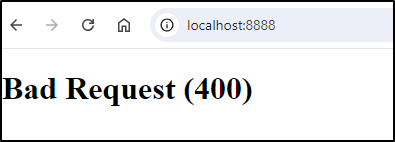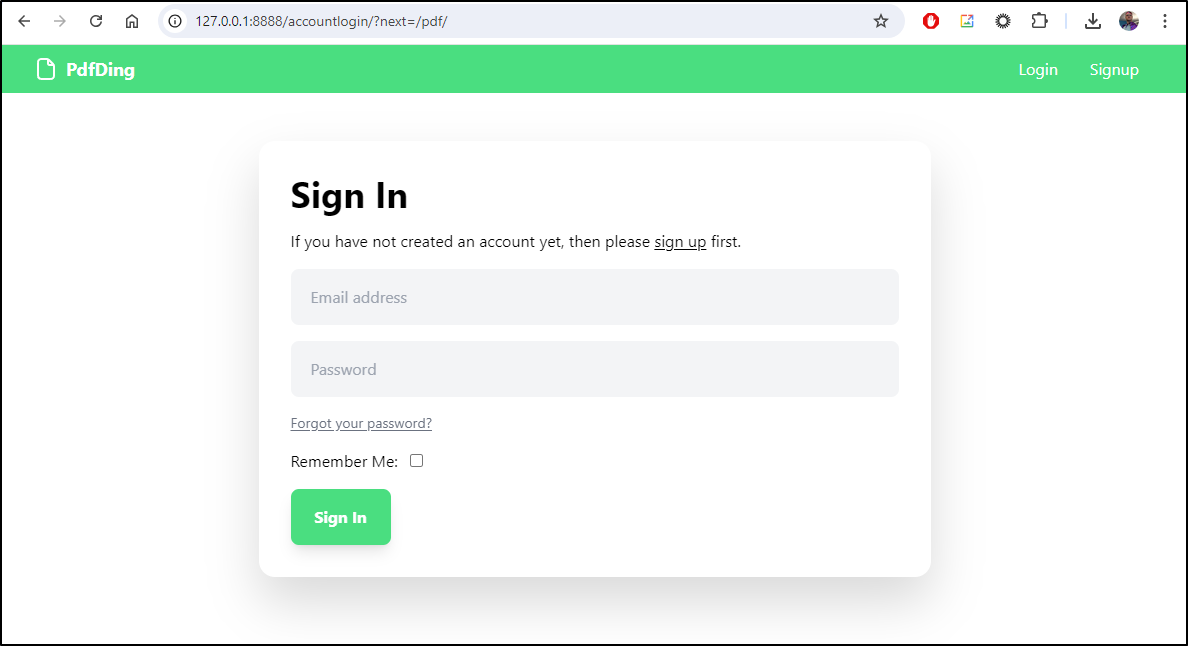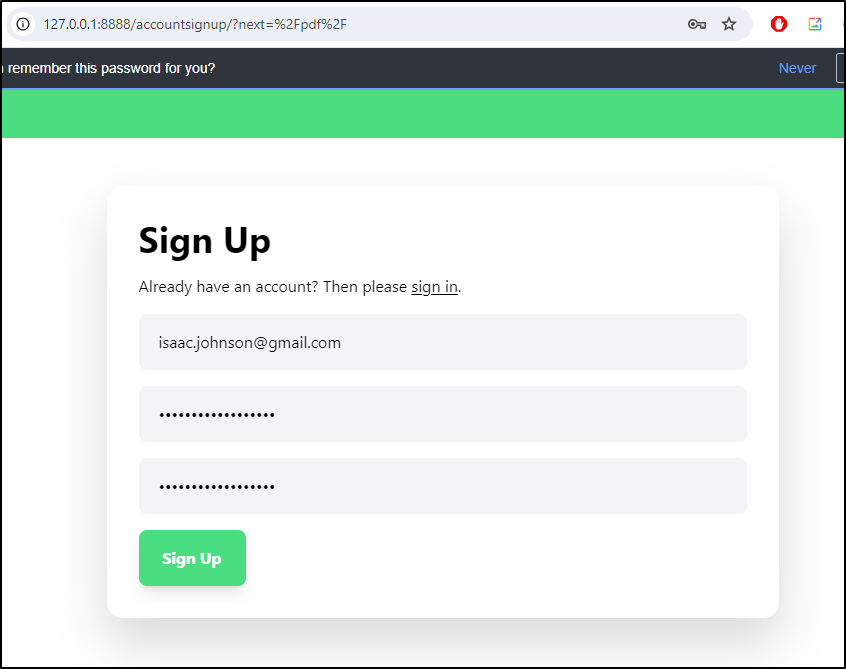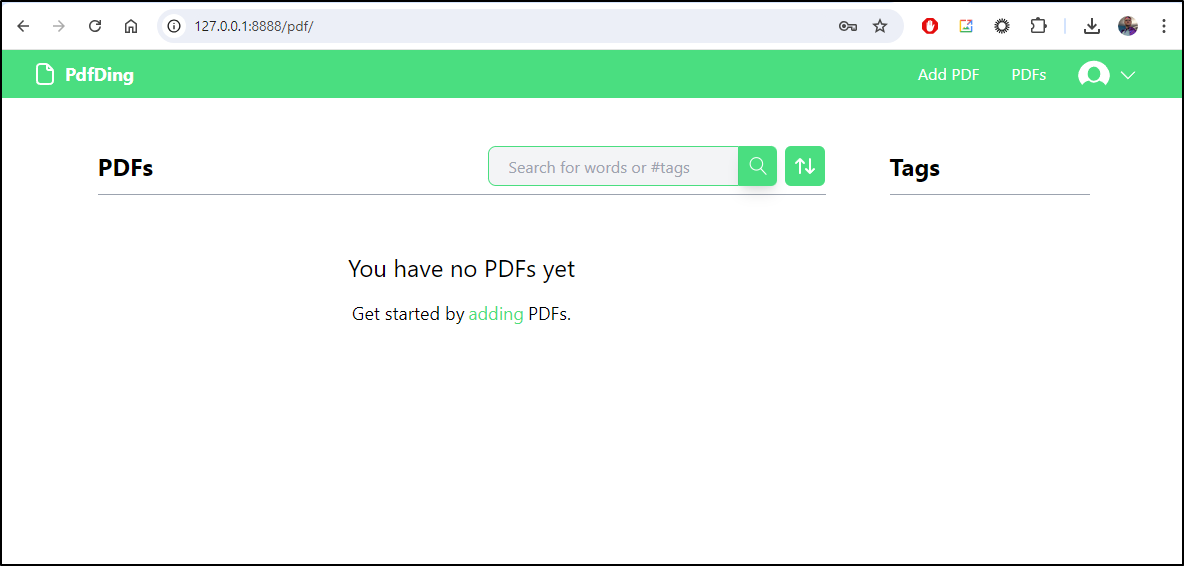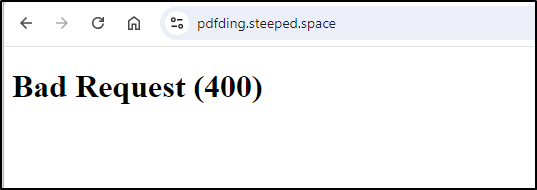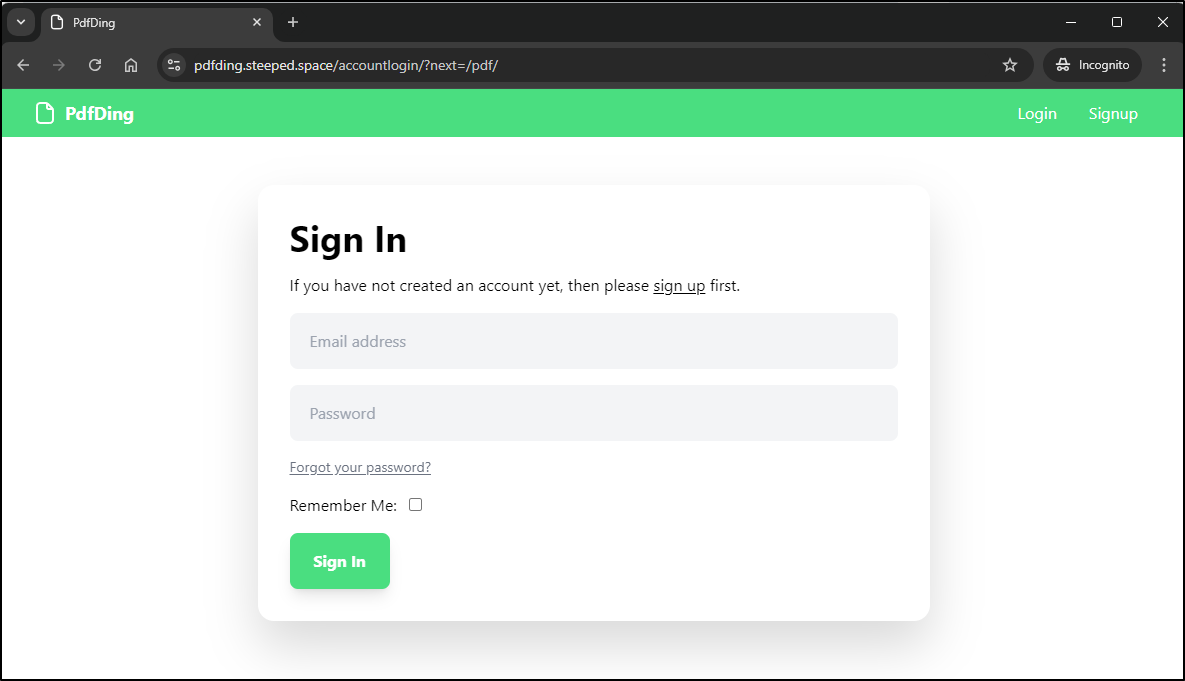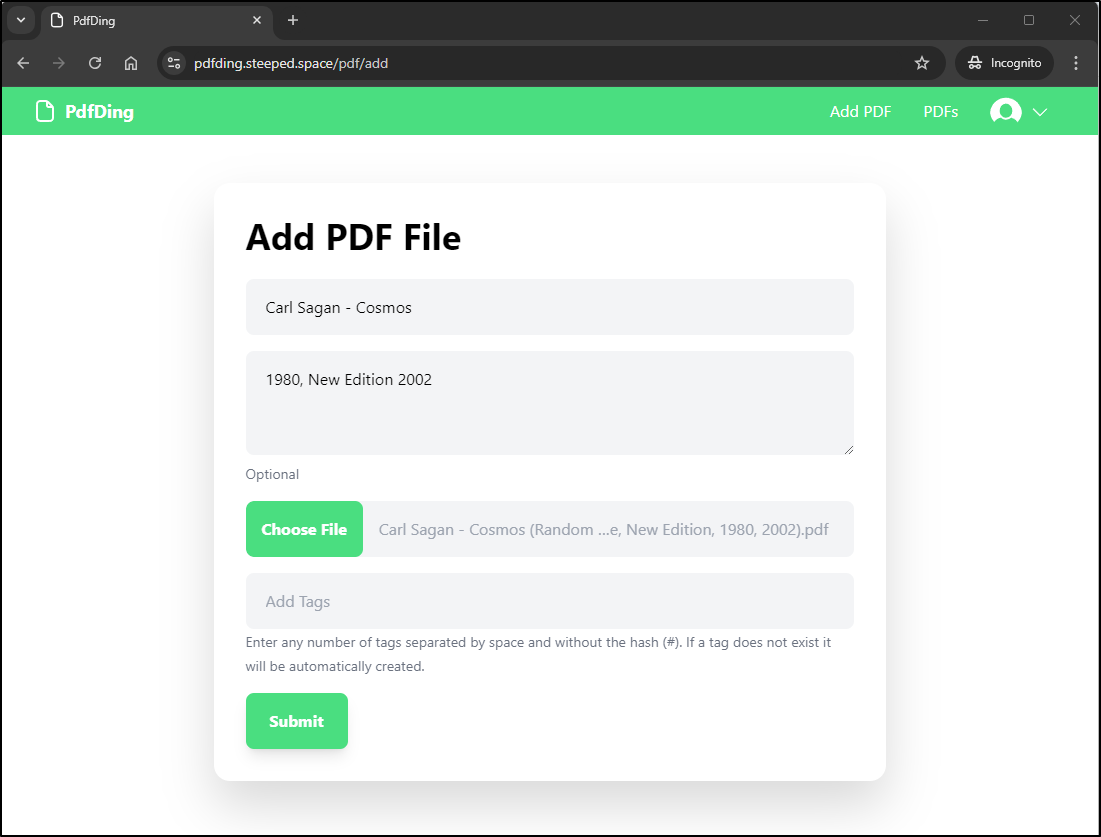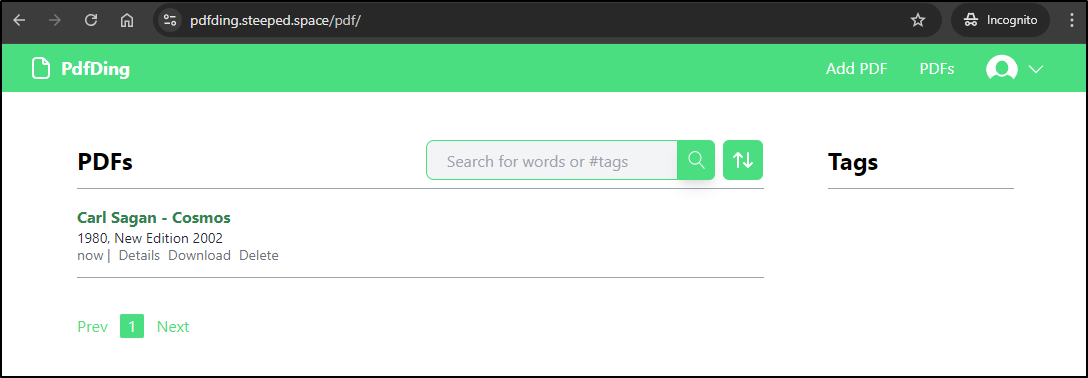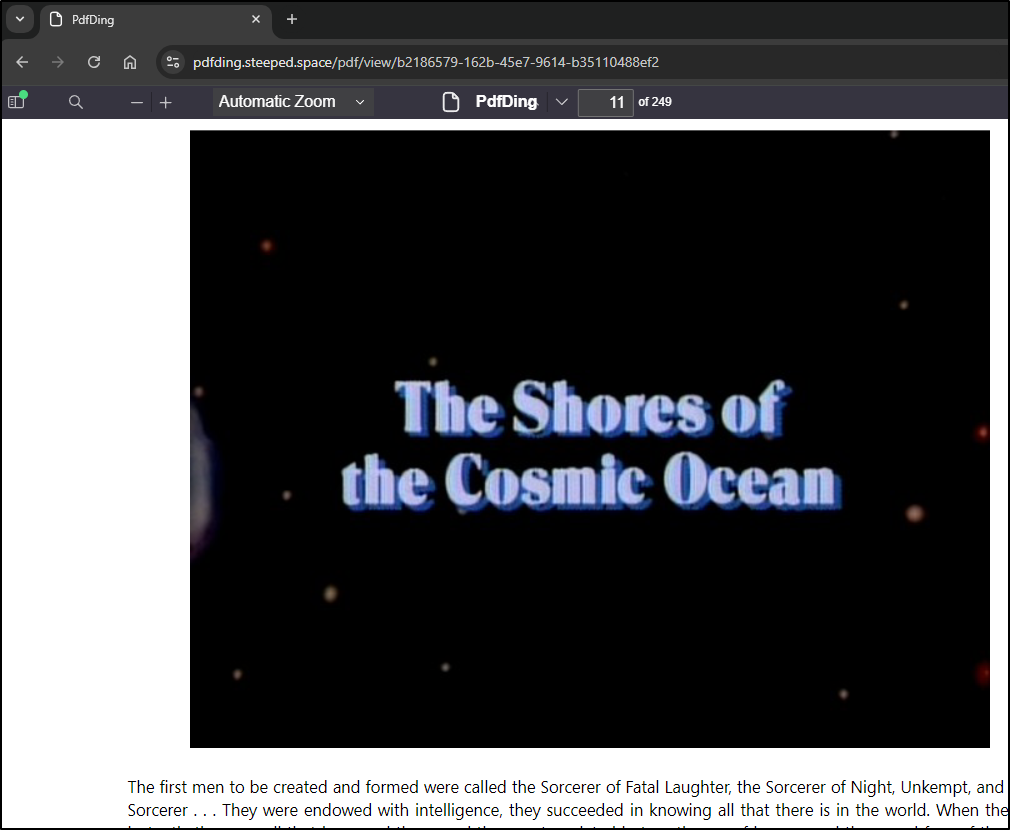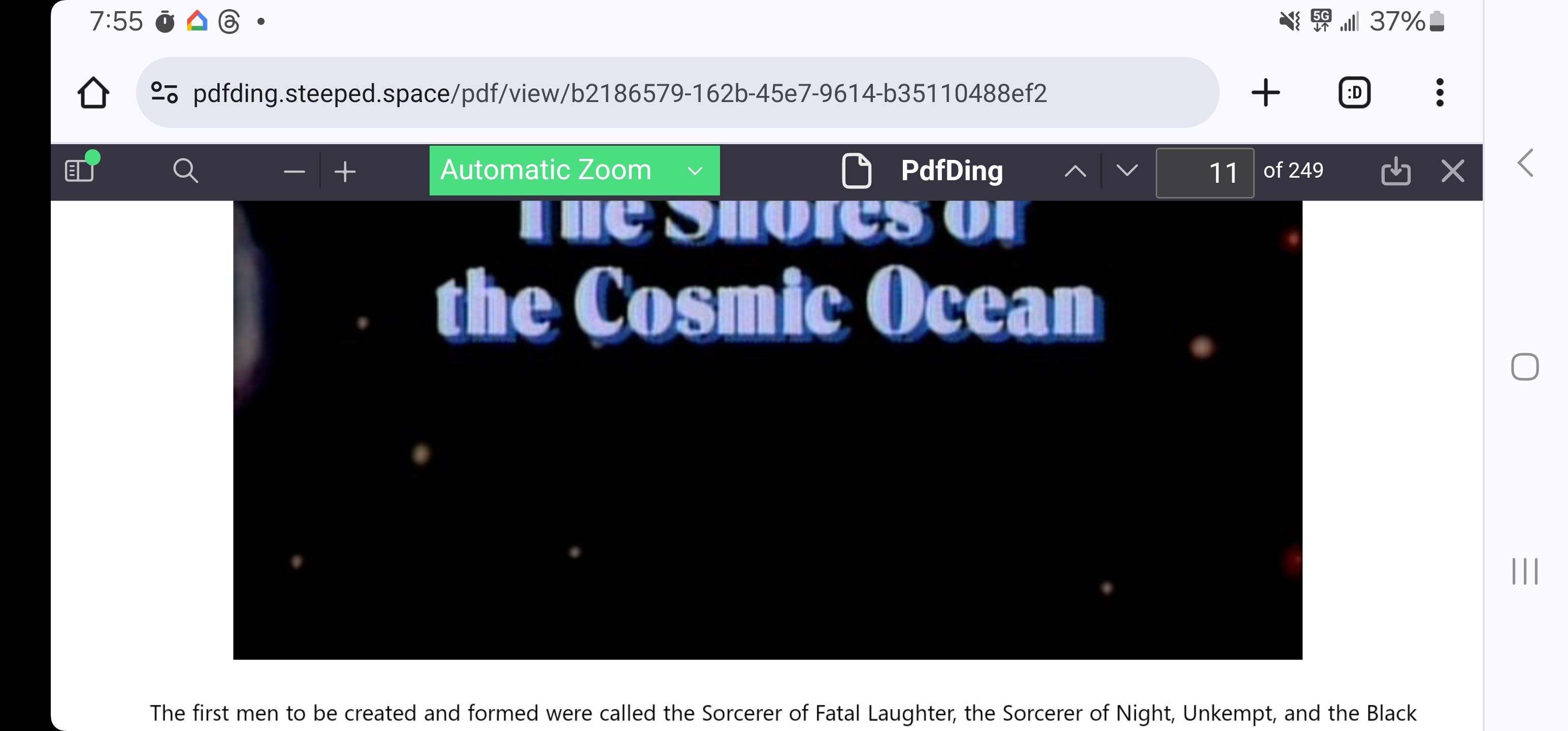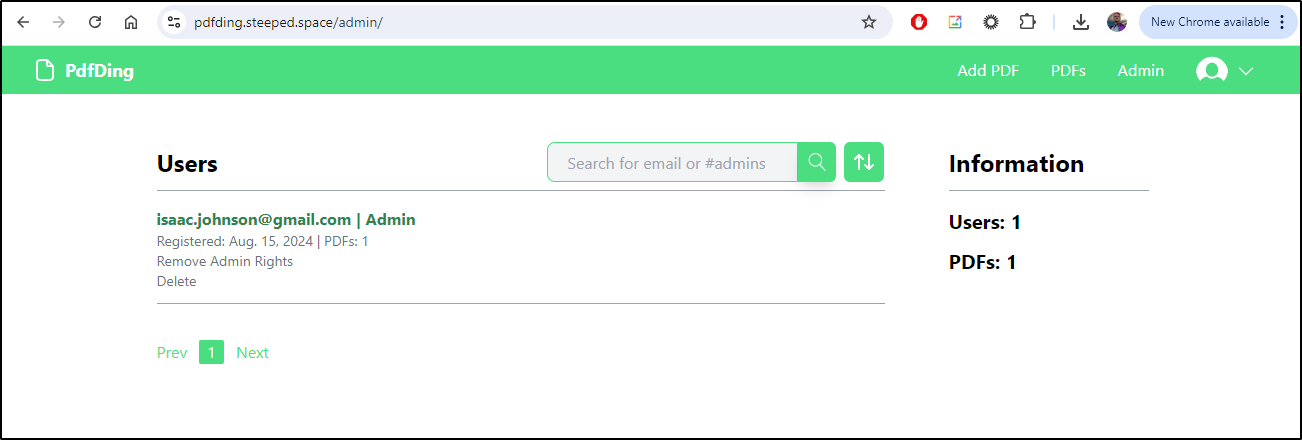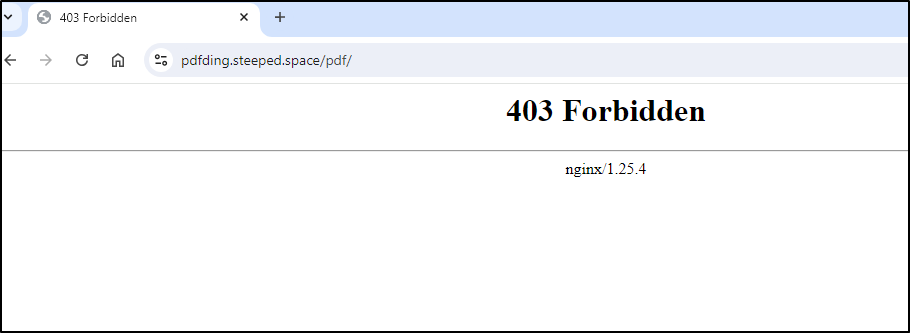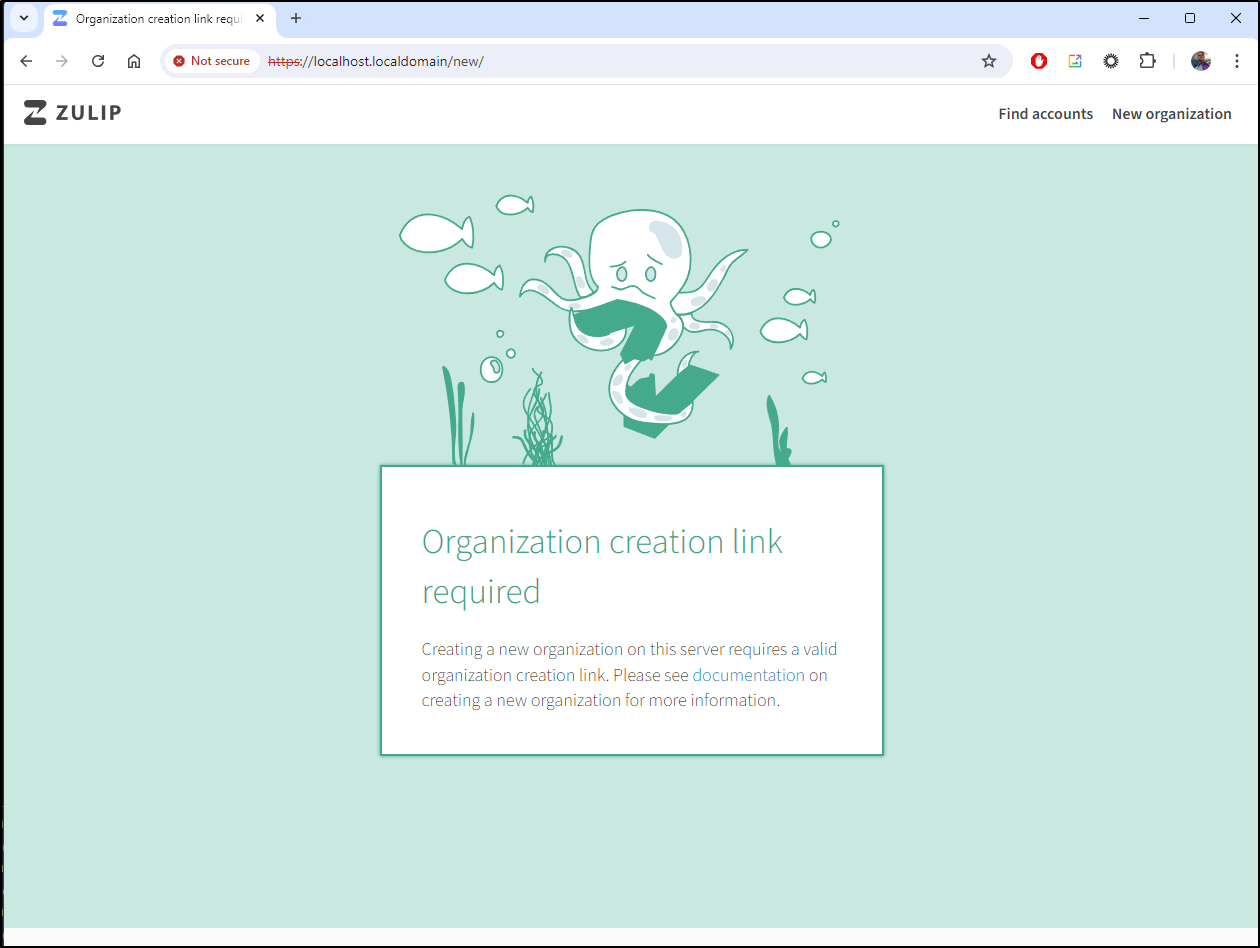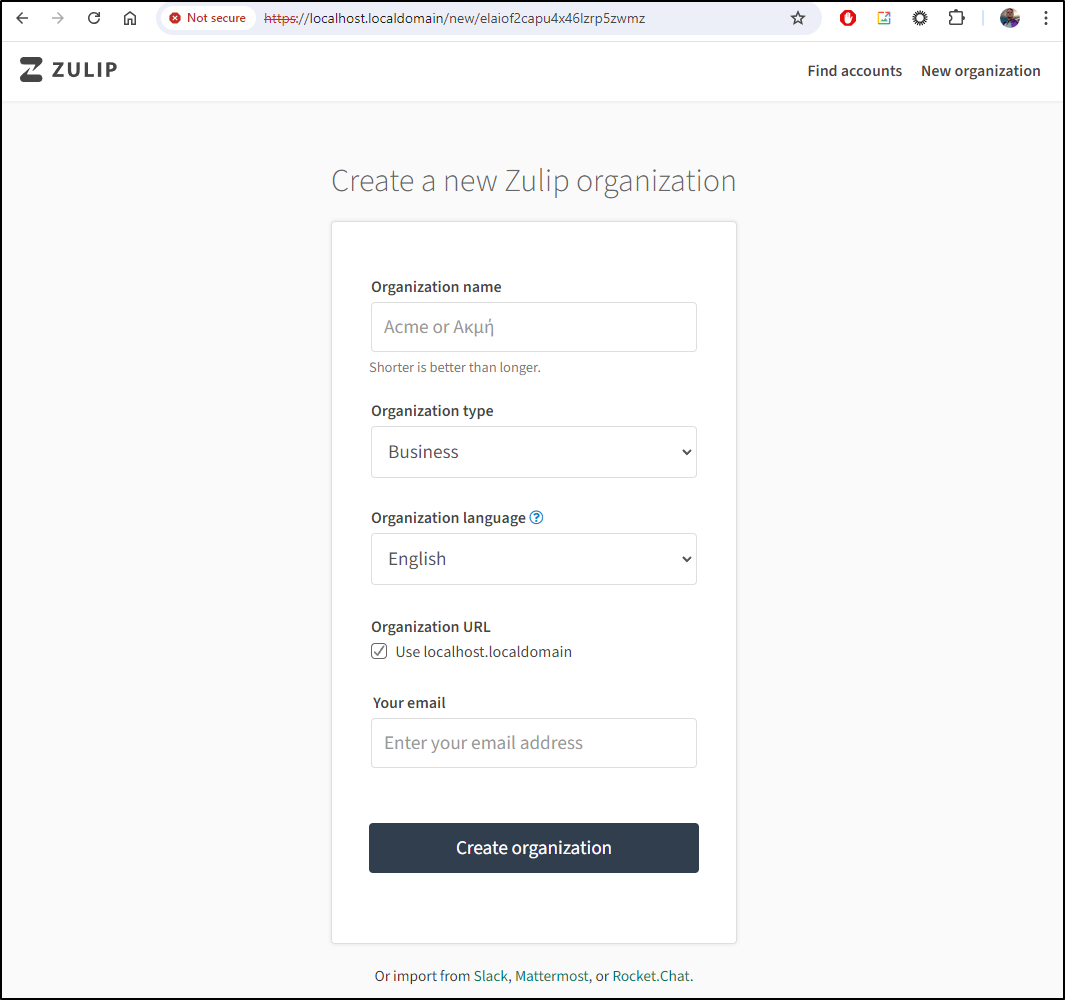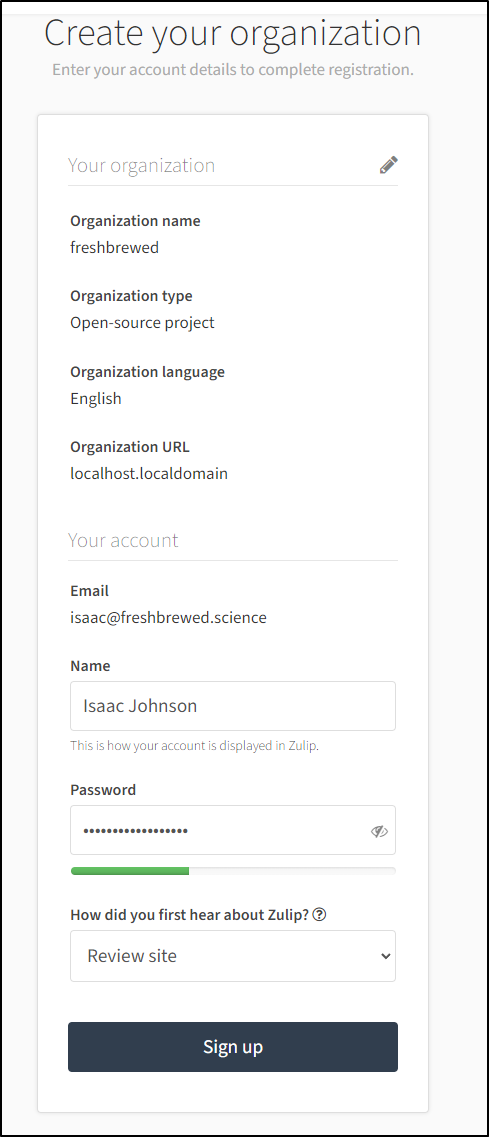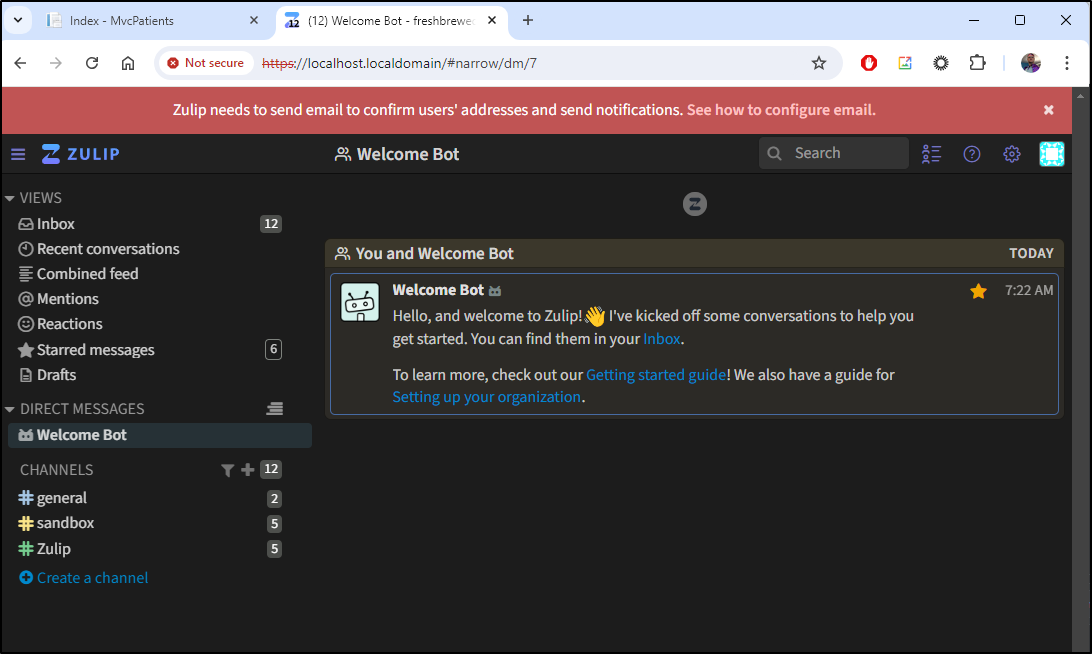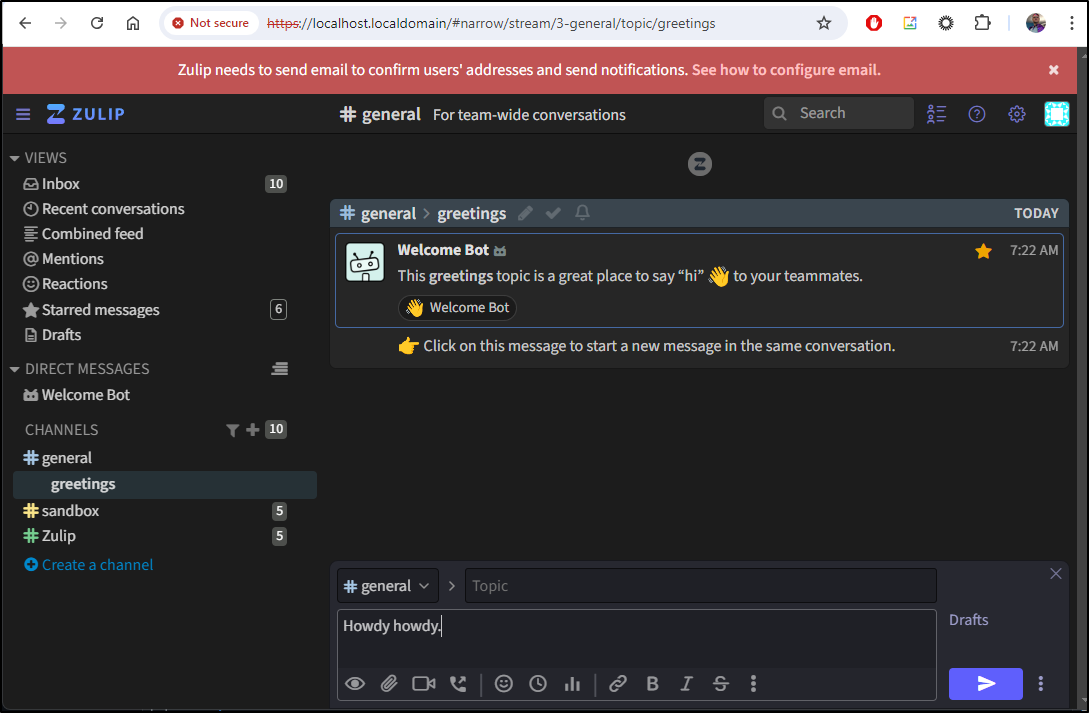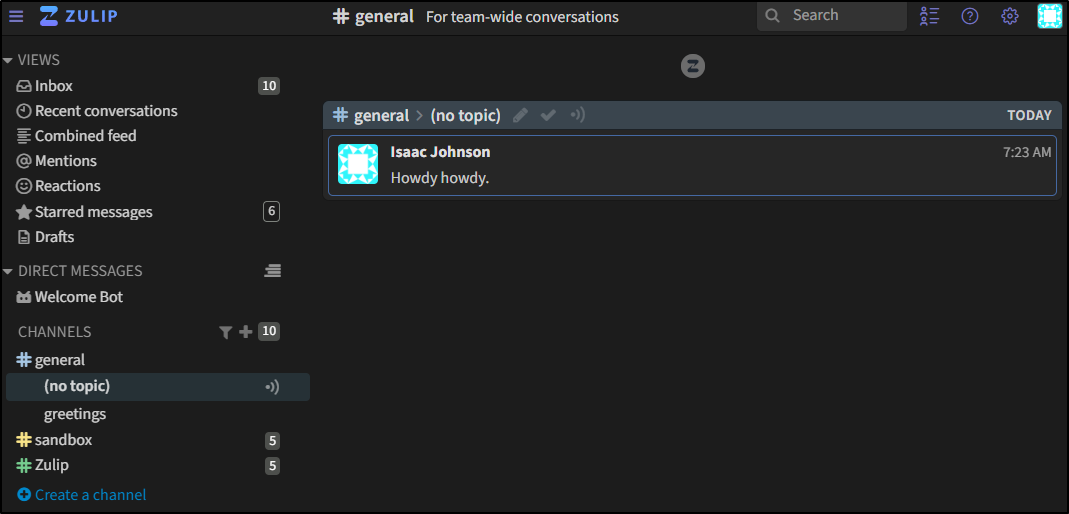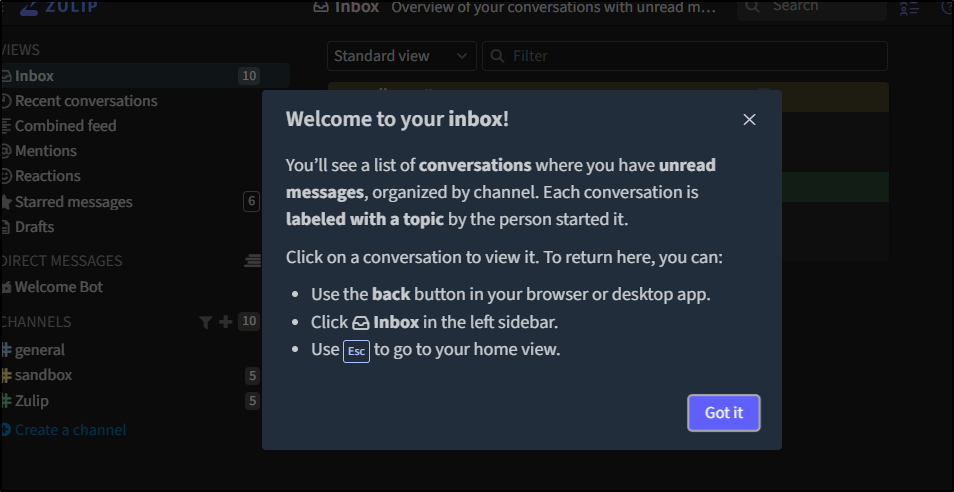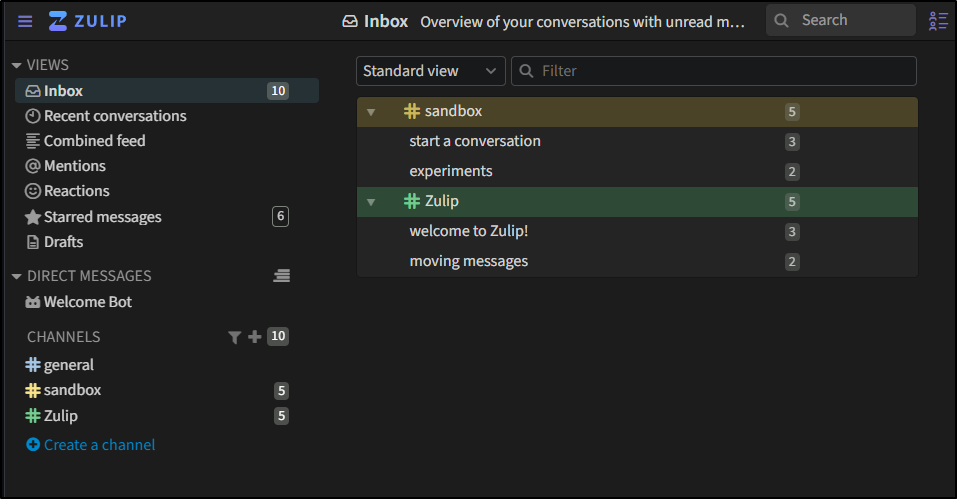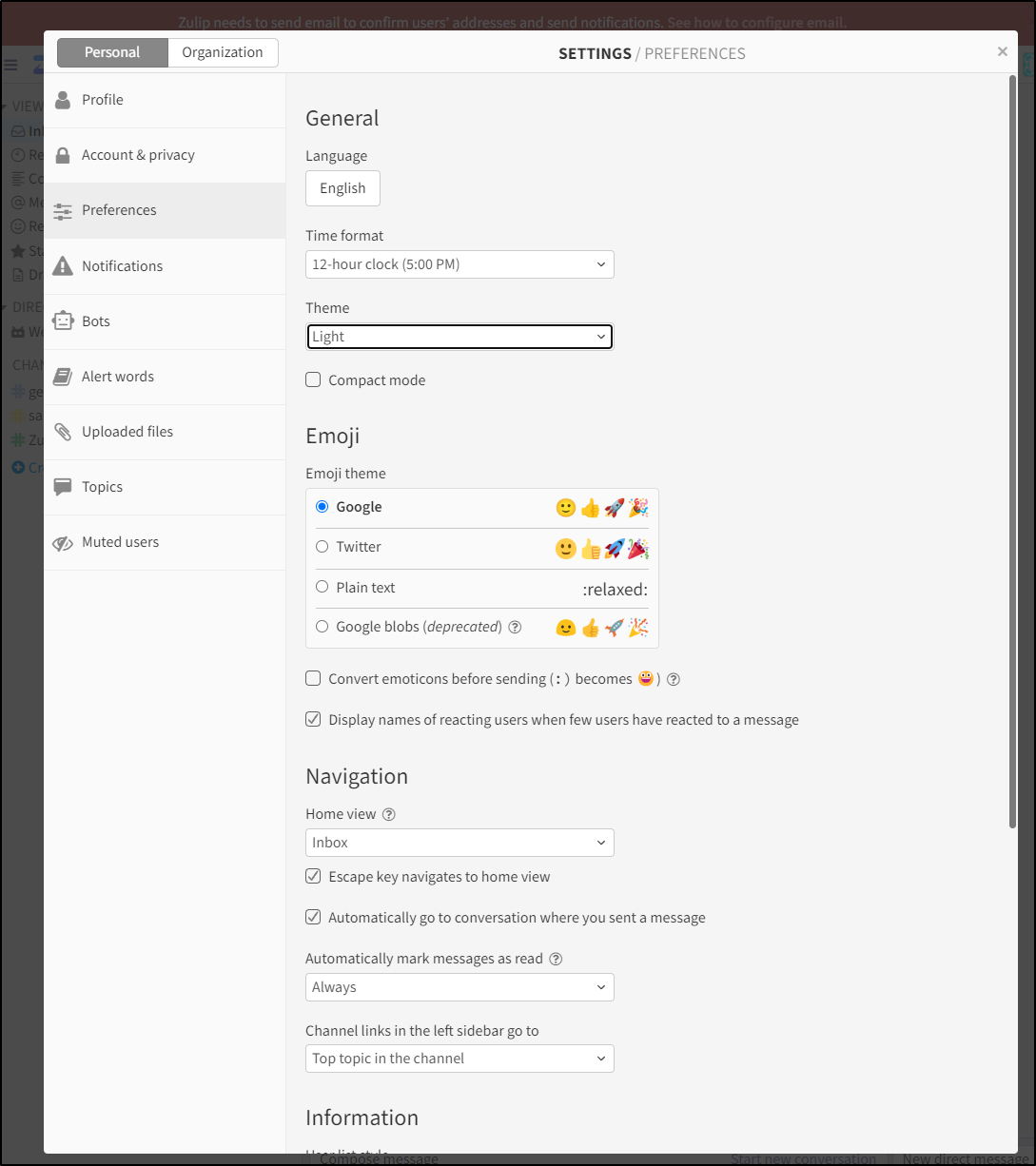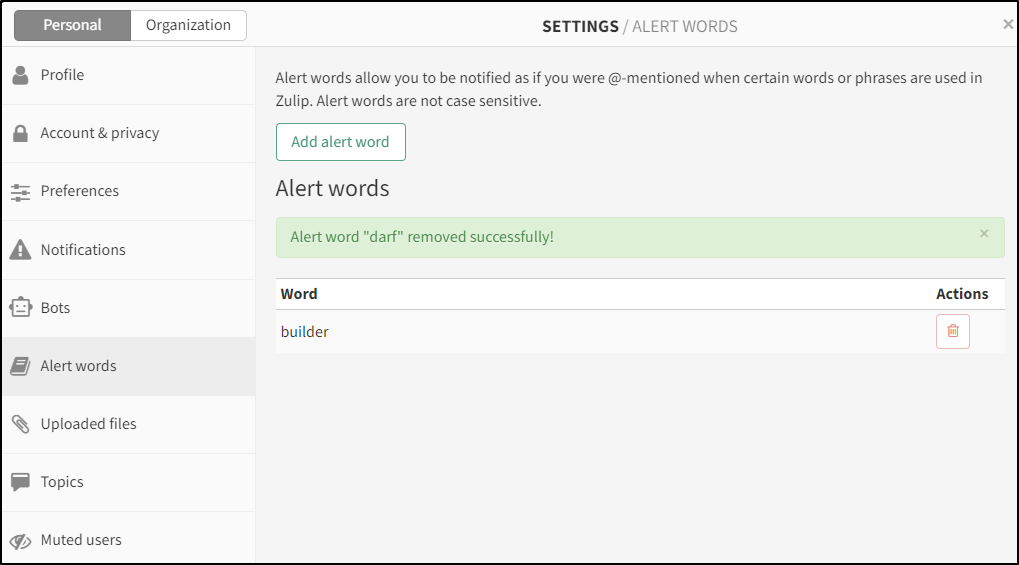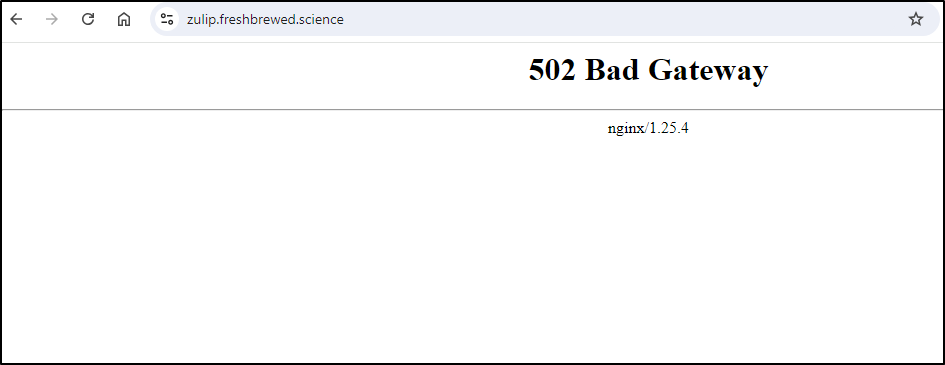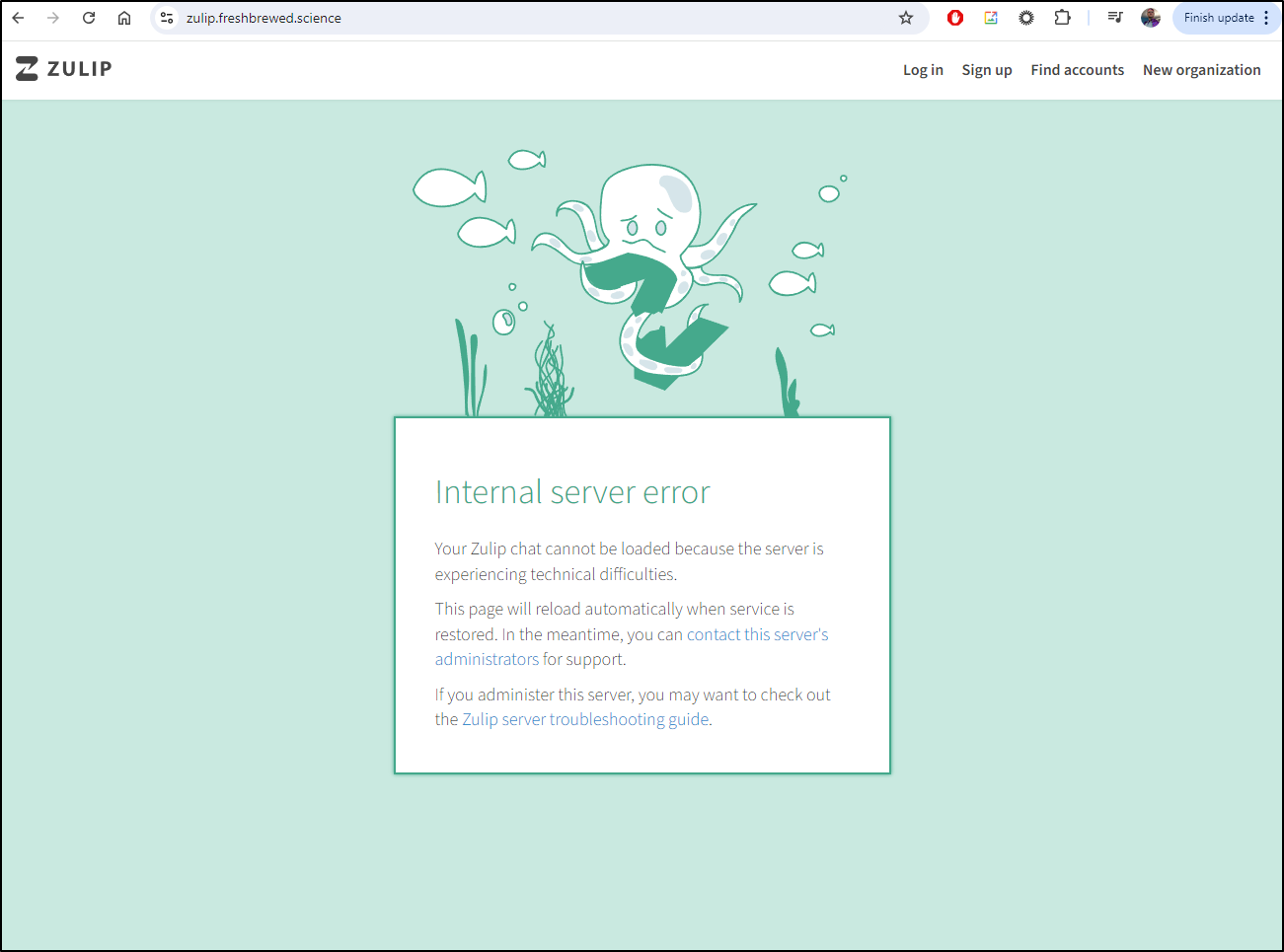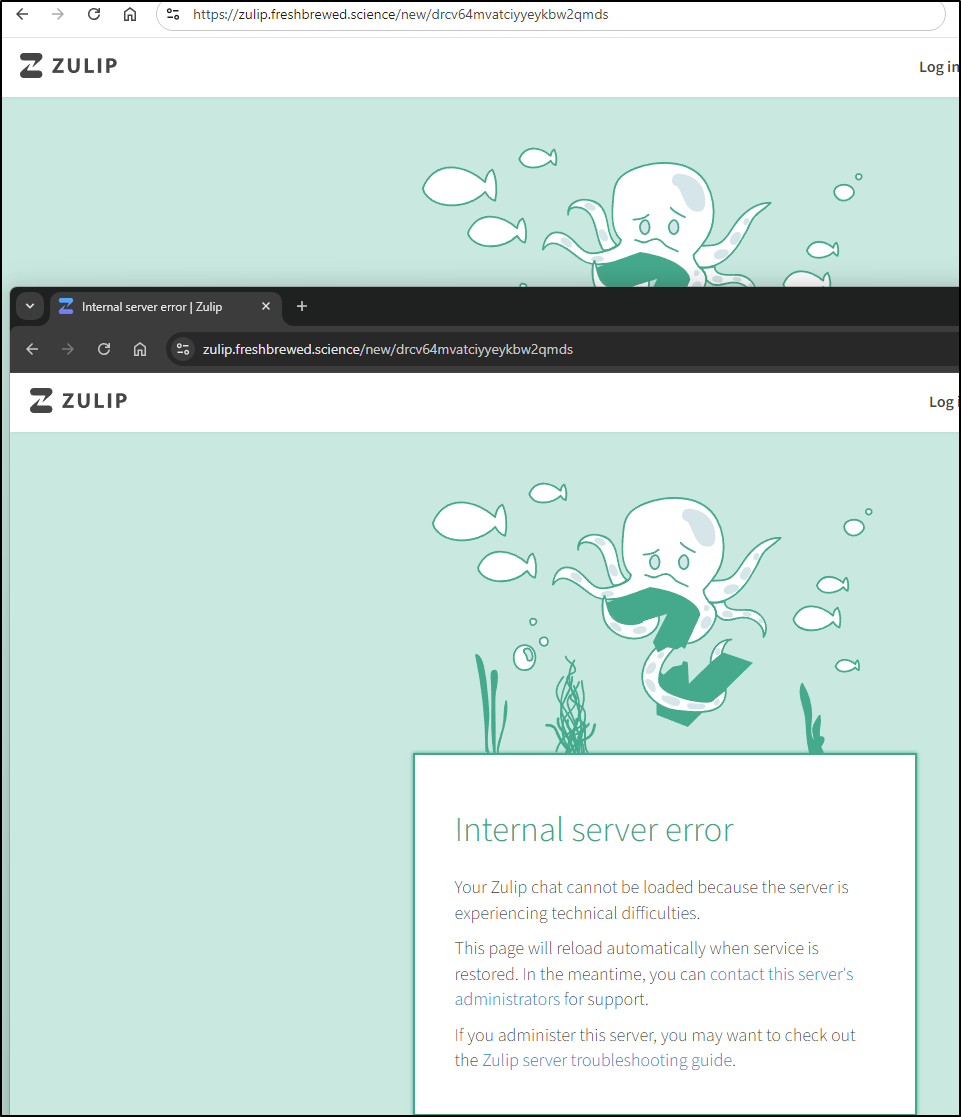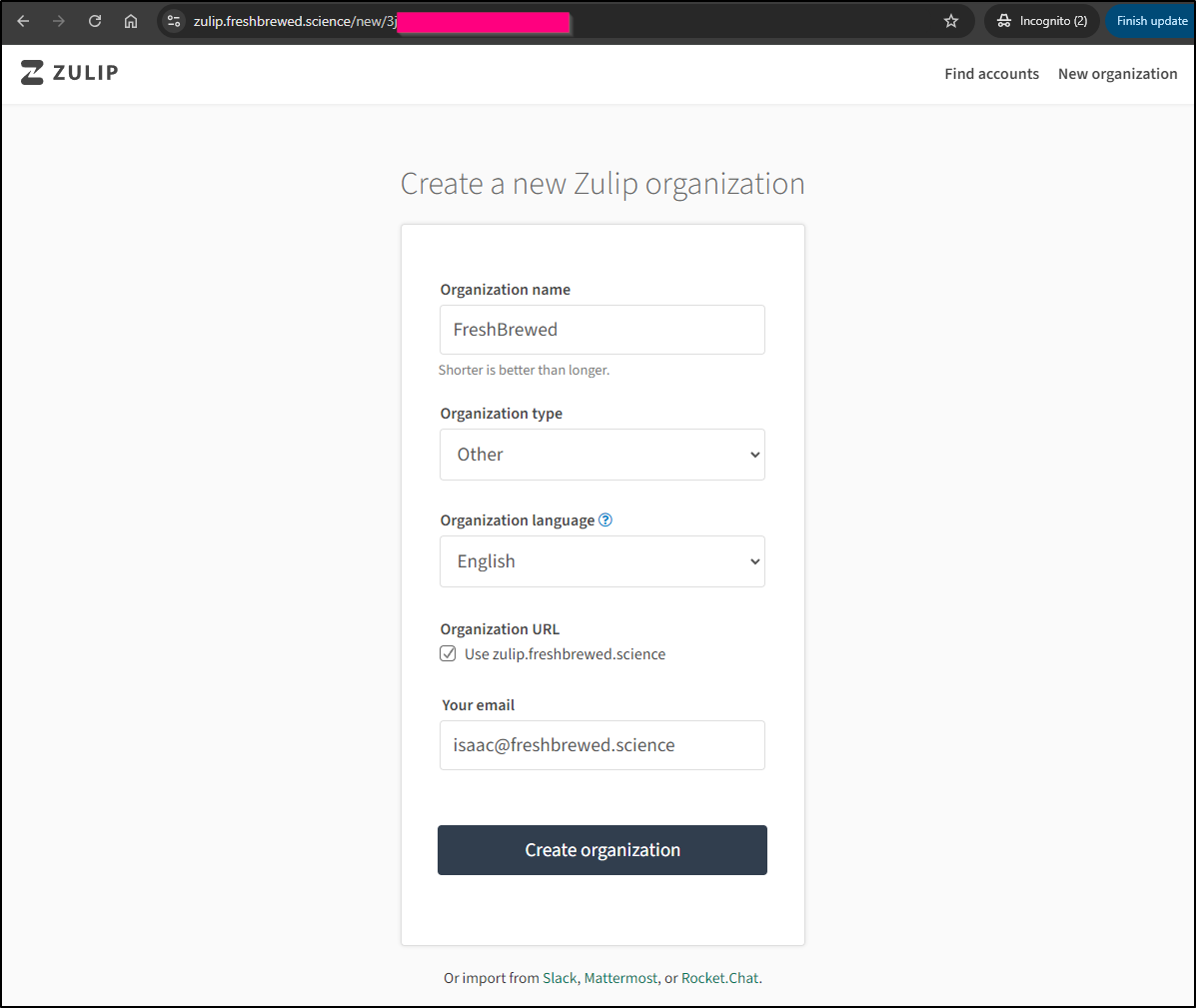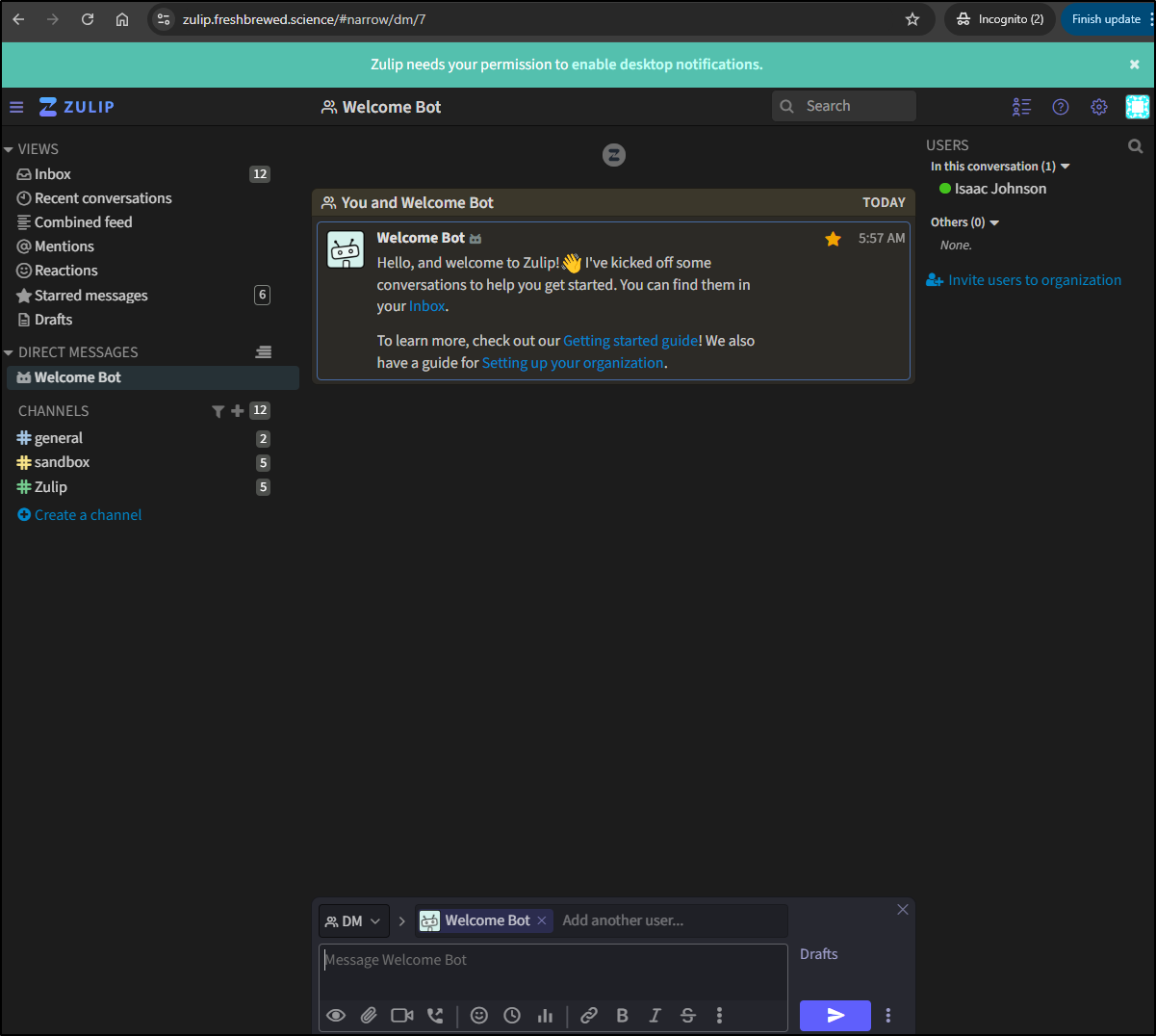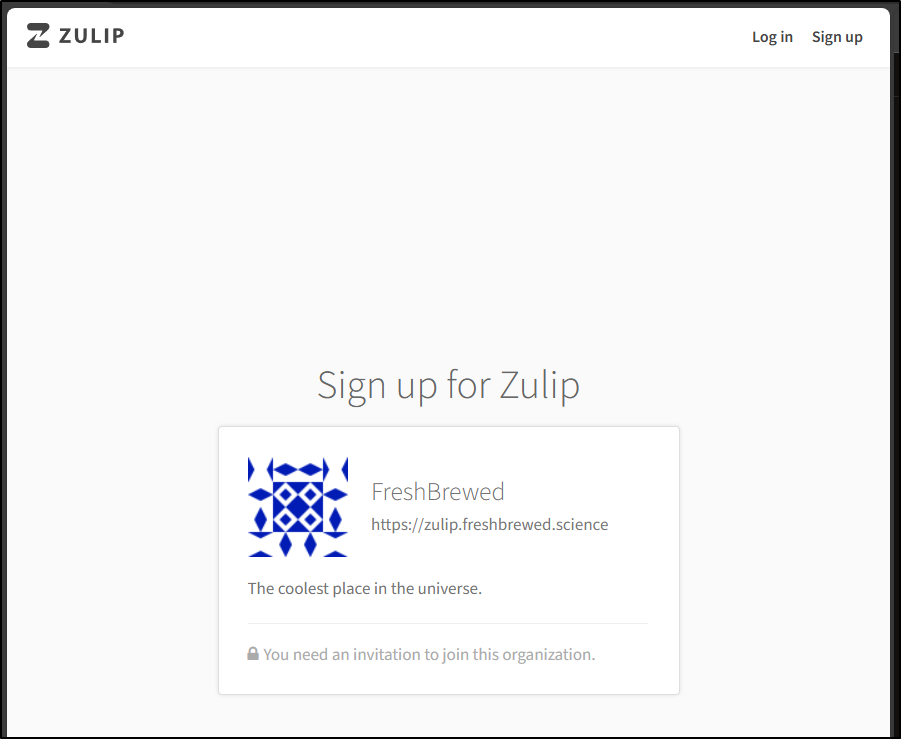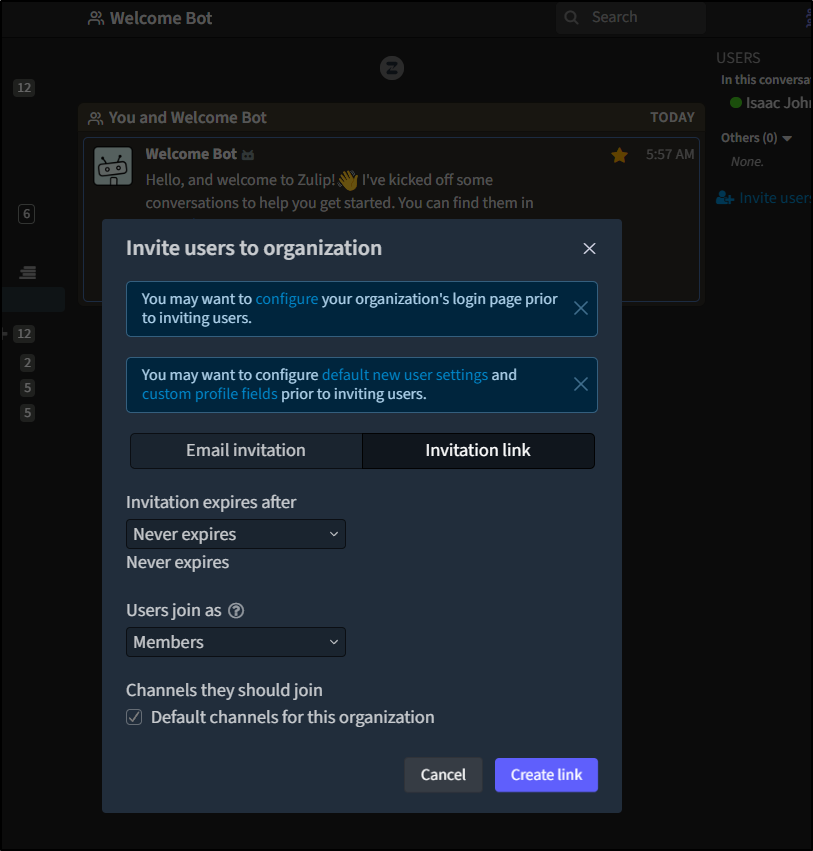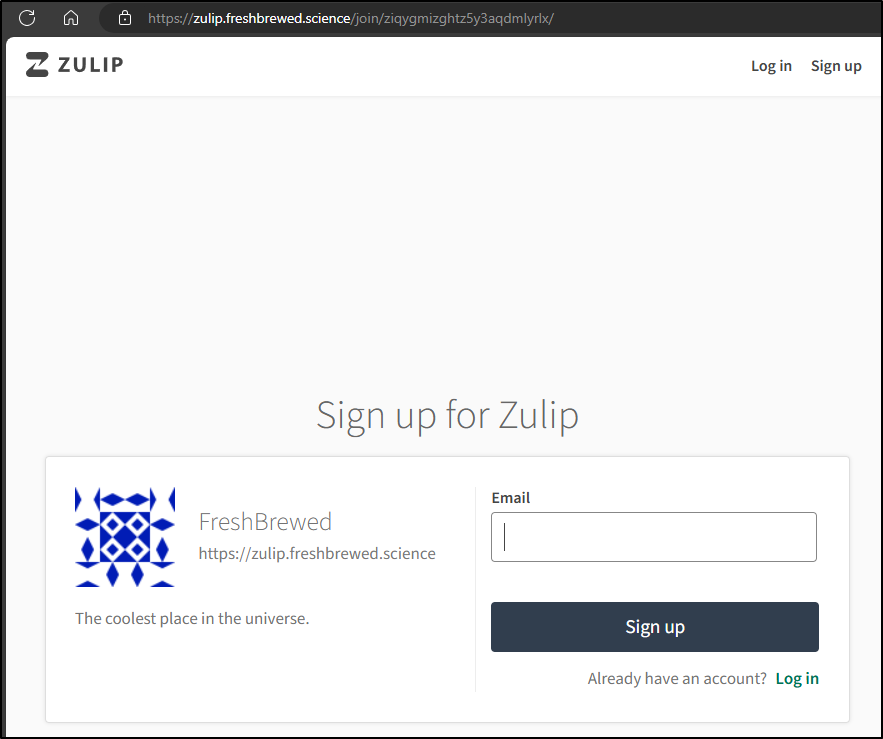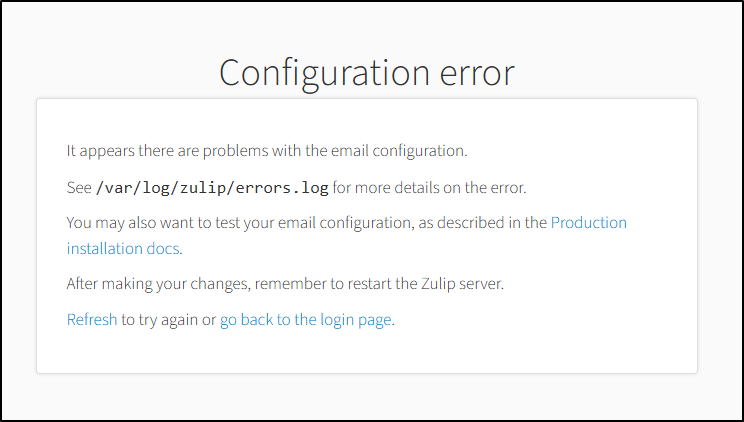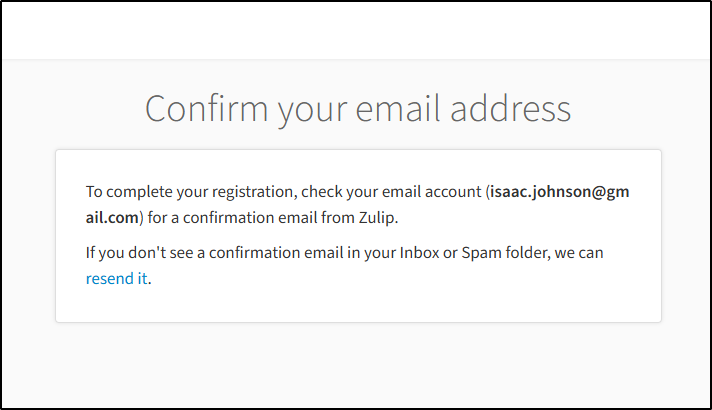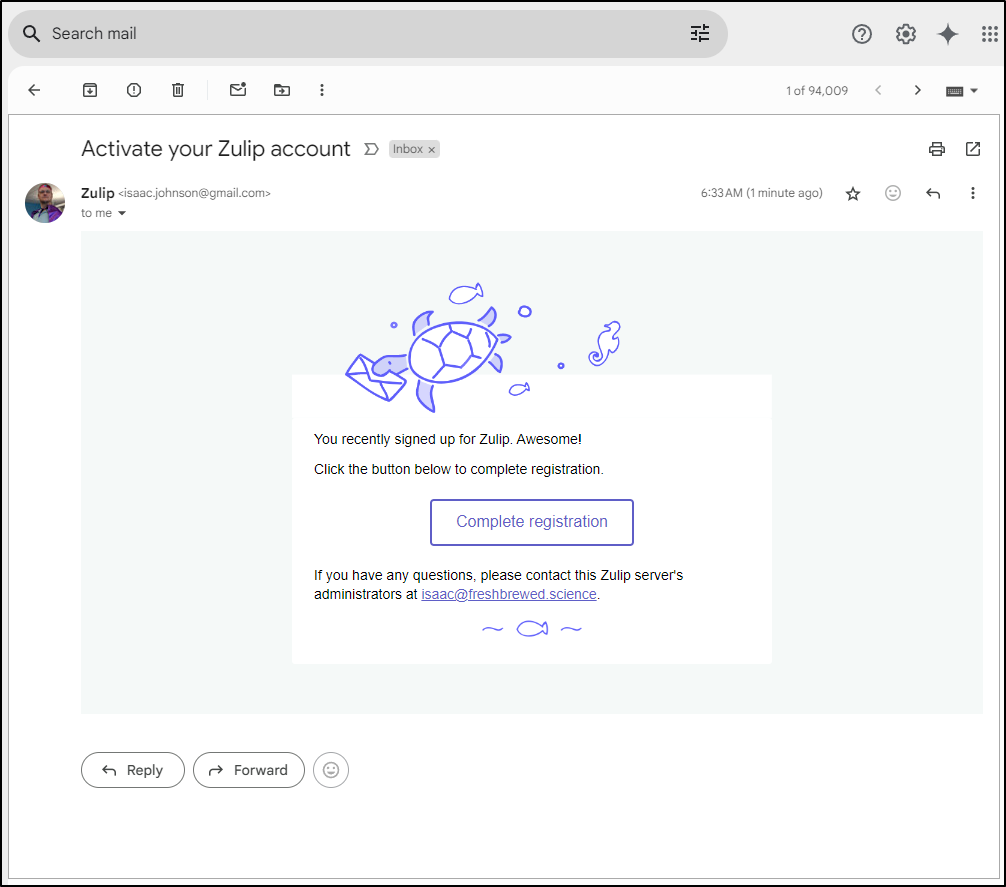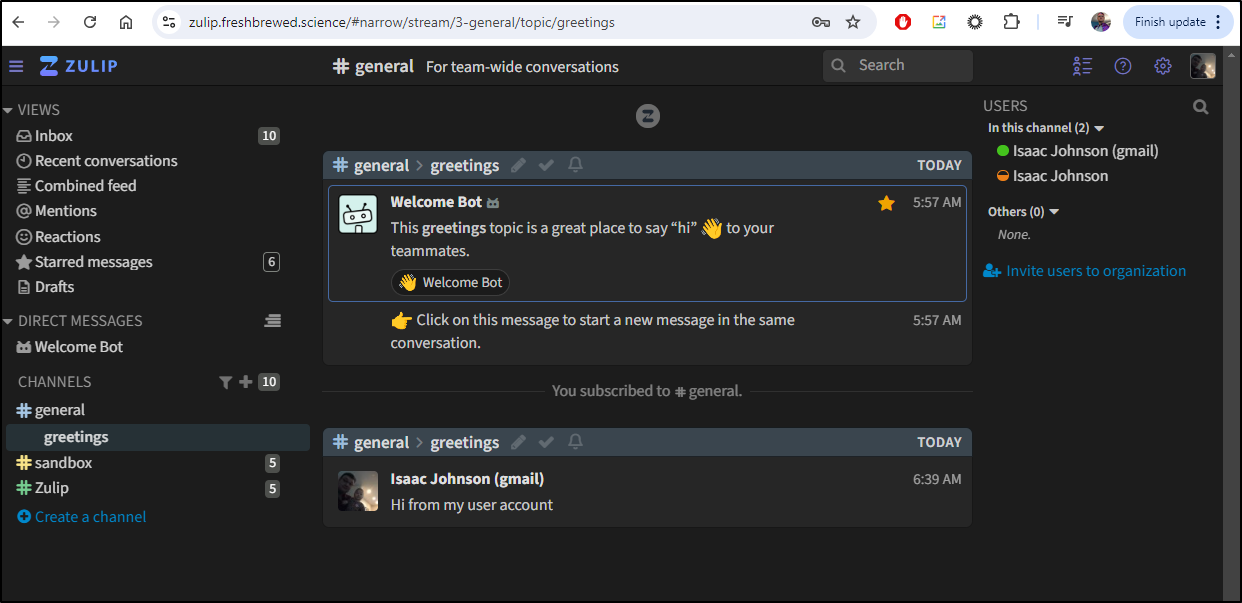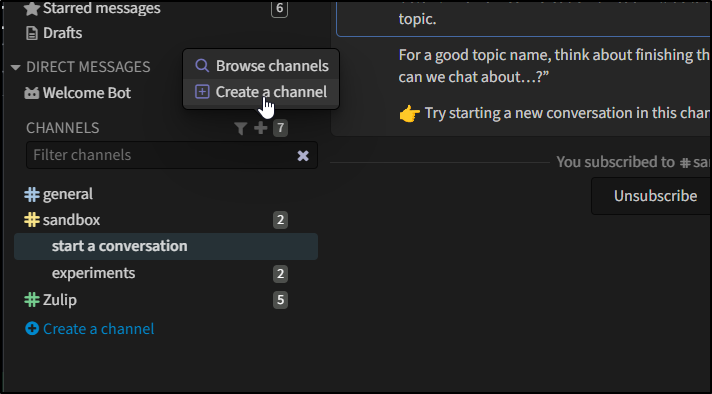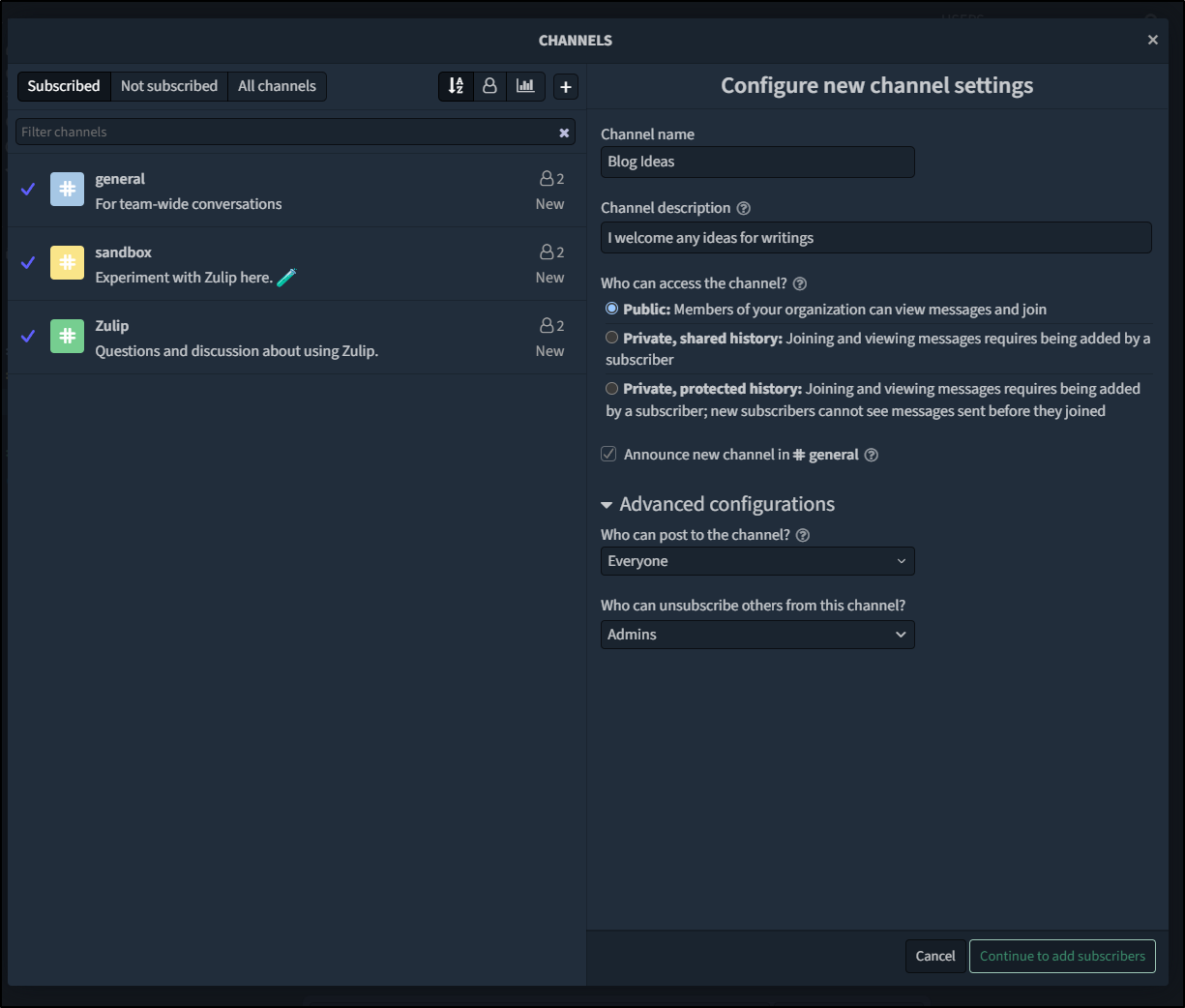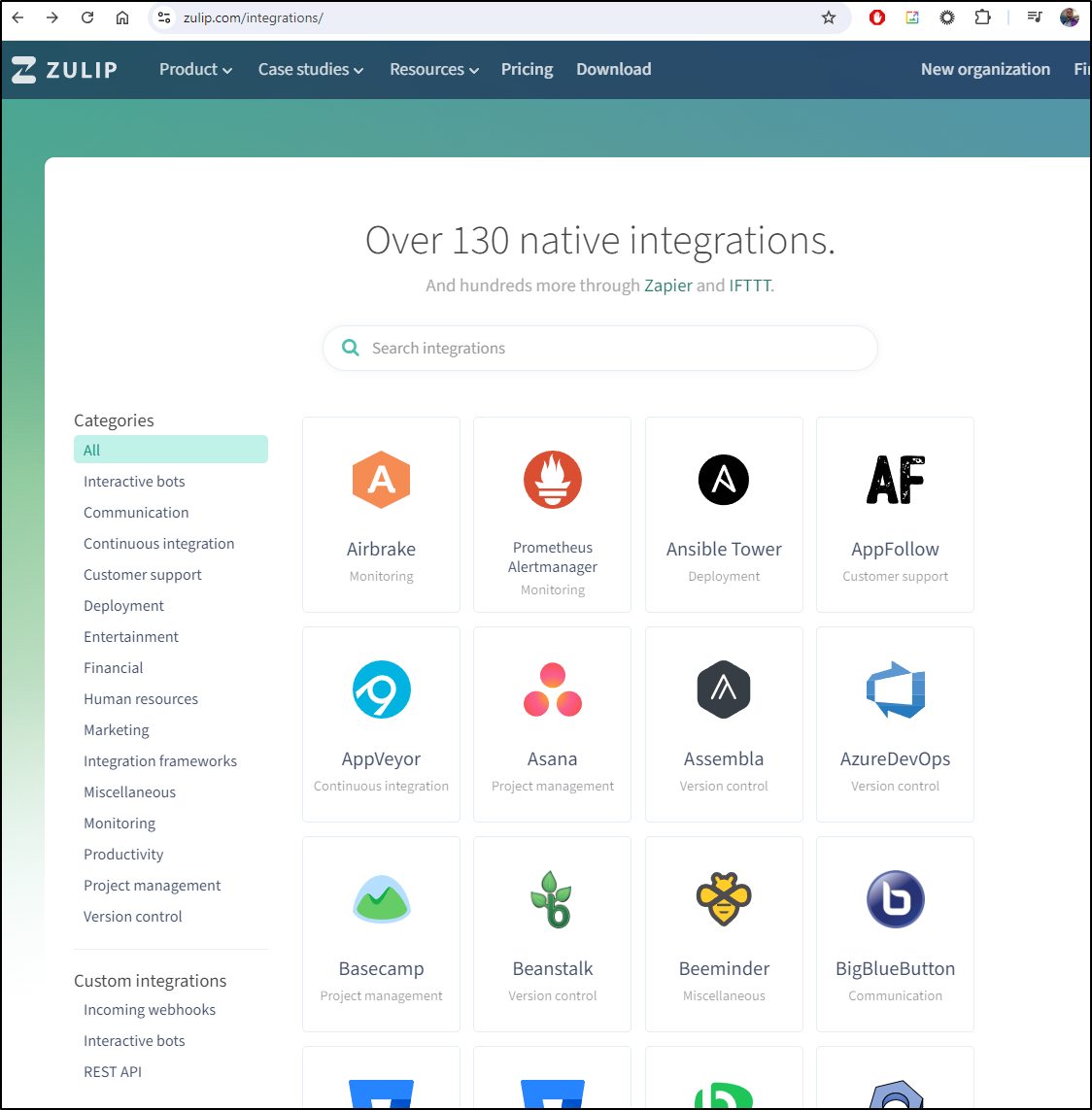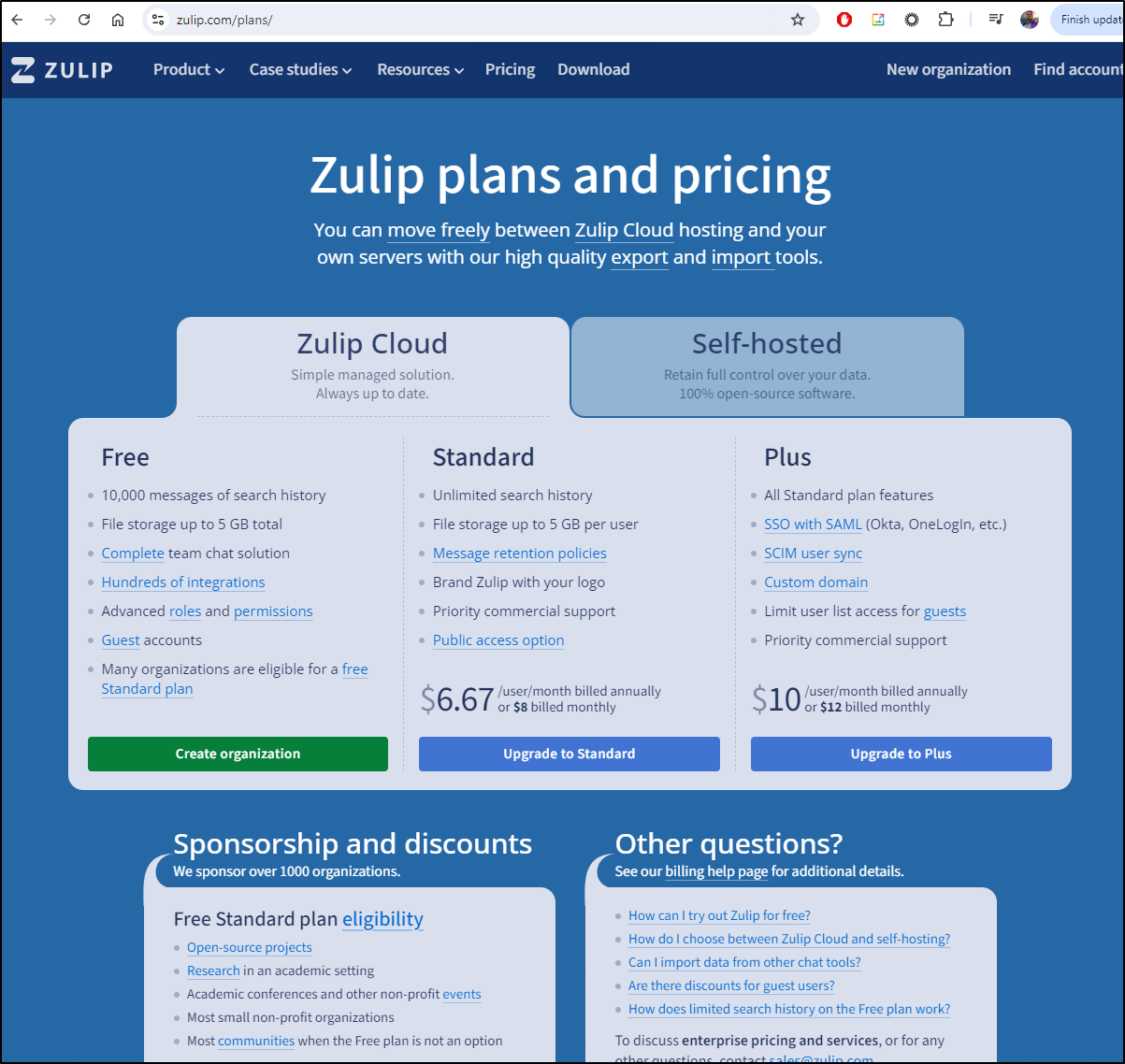Published: Aug 20, 2024 by Isaac Johnson
Today we will check out a couple of interesting Open-Source projects. The first of which is PdfDing. PDFDing is a lightweight Python based app for viewing a library of self-hosted PDFs. I discovered it by way of MariusHosting and it’s not on Github, rather Codeberg.
Zulip is another Slack-like Open-Source chat app that people are starting to migrate too following Element’s decision to change some of the license terms of Matrix Server.
PdfDing
I had bookmarked this MariusHosting post about setting up PdfDing.
That block is largely focused on using Docker on a NAS.
At the simplist, we can use a single container image with an embedded sqlite instance:
$ docker run --name pdfding \
-p 8000:8000 \
-v sqlite_data:/home/nonroot/pdfding/db -v media:/home/nonroot/pdfding/media \
-e HOST_NAME=127.0.0.1 -e SECRET_KEY=some_secret -e CSRF_COOKIE_SECURE=FALSE -e SESSION_COOKIE_SECURE=FALSE \
-d \
mrmn/pdfding:latest
I can easily turn that into a Manifest YAML for Kubernetes
apiVersion: v1
kind: PersistentVolumeClaim
metadata:
name: sqlite-data-pvc
spec:
accessModes:
- ReadWriteOnce
storageClassName: local-path
resources:
requests:
storage: 2Gi
---
apiVersion: v1
kind: PersistentVolumeClaim
metadata:
name: media-pvc
spec:
accessModes:
- ReadWriteOnce
storageClassName: local-path
resources:
requests:
storage: 2Gi
---
apiVersion: apps/v1
kind: Deployment
metadata:
name: pdfding
spec:
replicas: 1
selector:
matchLabels:
app: pdfding
template:
metadata:
labels:
app: pdfding
spec:
containers:
- name: pdfding
image: mrmn/pdfding:latest
ports:
- containerPort: 8000
env:
- name: HOST_NAME
value: "127.0.0.1"
- name: SECRET_KEY
value: "some_secret"
- name: CSRF_COOKIE_SECURE
value: "FALSE"
- name: SESSION_COOKIE_SECURE
value: "FALSE"
volumeMounts:
- mountPath: /home/nonroot/pdfding/db
name: sqlite-data
- mountPath: /home/nonroot/pdfding/media
name: media
volumes:
- name: sqlite-data
persistentVolumeClaim:
claimName: sqlite-data-pvc
- name: media
persistentVolumeClaim:
claimName: media-pvc
---
apiVersion: v1
kind: Service
metadata:
name: pdfding-service
spec:
selector:
app: pdfding
ports:
- protocol: TCP
port: 80
targetPort: 8000
type: LoadBalancer
I can then apply it in a new namespace
builder@DESKTOP-QADGF36:~/Workspaces/pdfding$ kubectl create ns pdfding
namespace/pdfding created
builder@DESKTOP-QADGF36:~/Workspaces/pdfding$ kubectl apply -f ./manifest.yaml -n pdfding
persistentvolumeclaim/sqlite-data-pvc created
persistentvolumeclaim/media-pvc created
deployment.apps/pdfding created
service/pdfding-service created
I can port-forward to the service
builder@DESKTOP-QADGF36:~/Workspaces/pdfding$ kubectl port-forward svc/pdfding-service -n pdfding 8888:80
Forwarding from 127.0.0.1:8888 -> 8000
Forwarding from [::1]:8888 -> 8000
However, I got an error
Seems the hostname is rather dependent so localhost didn’t work but 127.0.0.1 did
Since I have no accounts, I first need to signup for one
I’m then greeted with a landing page
Ingress
I’ll first make an A Record in CloudDNS
$ gcloud dns --project=myanthosproject2 record-sets create pdfding.steeped.space --zone="steepedspace" --type="A" --ttl="300" --rrdatas="75.73.224.240"
NAME TYPE TTL DATA
pdfding.steeped.space. A 300 75.73.224.240
Then make the Ingress YAML
builder@DESKTOP-QADGF36:~/Workspaces/pdfding$ cat pdfding.ingress.yaml
apiVersion: v1
kind: List
metadata:
resourceVersion: ""
items:
- apiVersion: networking.k8s.io/v1
kind: Ingress
metadata:
annotations:
cert-manager.io/cluster-issuer: gcpleprod2
ingress.kubernetes.io/proxy-body-size: "0"
ingress.kubernetes.io/ssl-redirect: "true"
kubernetes.io/ingress.class: nginx
kubernetes.io/tls-acme: "true"
nginx.ingress.kubernetes.io/proxy-body-size: "0"
nginx.ingress.kubernetes.io/proxy-read-timeout: "3600"
nginx.ingress.kubernetes.io/proxy-send-timeout: "3600"
nginx.ingress.kubernetes.io/ssl-redirect: "true"
nginx.org/client-max-body-size: "0"
nginx.org/proxy-connect-timeout: "3600"
nginx.org/proxy-read-timeout: "3600"
nginx.org/websocket-services: pdfding-service
name: pdfdingingress
namespace: pdfding
spec:
rules:
- host: pdfding.steeped.space
http:
paths:
- backend:
service:
name: pdfding-service
port:
number: 80
path: /
pathType: ImplementationSpecific
tls:
- hosts:
- pdfding.steeped.space
secretName: pdfding-tls
builder@DESKTOP-QADGF36:~/Workspaces/pdfding$ kubectl apply -f ./pdfding.ingress.yaml
ingress.networking.k8s.io/pdfdingingress created
I get the same 400 error
I tried omitting “HOST_NAME” and setting it to “0.0.0.0”. While those failed, setting hostname to the DNS_NAME
env:
- name: HOST_NAME
value: "pdfding.steeped.space"
- name: SECRET_KEY
value: "mygreatsecret54321"
- name: CSRF_COOKIE_SECURE
value: "FALSE"
- name: SESSION_COOKIE_SECURE
value: "FALSE"
I then I want to add a PDF
I can now see it on the list
I can then read it in the browser
I logged in with my phone and found it remembered my place in the book
Make admin user
We have to hop into the pod to make ourselves the admin
builder@LuiGi:~/Workspaces/jekyll-blog$ kubectl get pods -n pdfding
NAME READY STATUS RESTARTS AGE
pdfding-b99897cbb-tpkpx 1/1 Running 0 10h
builder@LuiGi:~/Workspaces/jekyll-blog$ kubectl exec -it pdfding-b99897cbb-tpkpx -n pdfding -- /bin/bash
nonroot@pdfding-b99897cbb-tpkpx:~$ pdfding/manage.py make_admin -e isaac.johnson@gmail.com
nonroot@pdfding-b99897cbb-tpkpx:~$
I can now see an admin menu where I can edit users
Users
The problem I have is I don’t really want to allow the world to signup, but there is no other option besides implementing OIDC - at least in the settings as they stand.
I’m going to try basic auth
builder@DESKTOP-QADGF36:~/Workspaces/pdfding$ htpasswd -c auth builder
New password:
Re-type new password:
Adding password for user builder
builder@DESKTOP-QADGF36:~/Workspaces/pdfding$ kubectl create secret generic basic-auth -n pdfding --from-file=auth
secret/basic-auth created
I’ll then add to our ingress
builder@DESKTOP-QADGF36:~/Workspaces/pdfding$ kubectl get ingress -n pdfding pdfdingingress -o yaml > pdfding.ingress.yaml.set
builder@DESKTOP-QADGF36:~/Workspaces/pdfding$ kubectl get ingress -n pdfding pdfdingingress -o yaml > pdfding.ingress.yaml.new
builder@DESKTOP-QADGF36:~/Workspaces/pdfding$ vi pdfding.ingress.yaml.new
builder@DESKTOP-QADGF36:~/Workspaces/pdfding$ diff pdfding.ingress.yaml.new pdfding.ingress.yaml.set
8,13d7
< # type of authentication
< nginx.ingress.kubernetes.io/auth-type: basic
< # name of the secret that contains the user/password definitions
< nginx.ingress.kubernetes.io/auth-secret: basic-auth
< # message to display with an appropriate context why the authentication is required
< nginx.ingress.kubernetes.io/auth-realm: 'Authentication Required'
builder@DESKTOP-QADGF36:~/Workspaces/pdfding$ kubectl apply -f ./pdfding.ingress.yaml.new -n pdfding
ingress.networking.k8s.io/pdfdingingress configured
The older format seemed to prompt for password
nginx.org/basic-auth-secret: basic-auth
But then dump me to forbidden after authing
I guess I’ll just have to wait on a release. I didn’t detail it here, but I tried to update the image with disable signup option but that didn’t work. I’m still a bit stumped as when I look at the code in https://codeberg.org/mrmn/PdfDing/src/branch/master, i cannot find any of the UI strings so I have no idea from where it actually loads those pages.
In the meantime, we can keep an eye on the changelog for updates.
Zulip
I recently saw an article on TheNewStack about Zulip which is an OS Chat app that, according to TheNewStack, Rust developers prefer over Slack. That brought me to Zulip.org/com which brought me to Docker install instructions in their Github Repo.
I’m going to try the quickest version first to see if I like it. This means just cloning and doing a Docker Compose up
builder@DESKTOP-QADGF36:~/Workspaces$ git clone https://github.com/zulip/docker-zulip.git
Cloning into 'docker-zulip'...
remote: Enumerating objects: 4055, done.
remote: Counting objects: 100% (499/499), done.
remote: Compressing objects: 100% (190/190), done.
remote: Total 4055 (delta 317), reused 417 (delta 281), pack-reused 3556 (from 1)
Receiving objects: 100% (4055/4055), 1.08 MiB | 5.80 MiB/s, done.
Resolving deltas: 100% (2355/2355), done.
builder@DESKTOP-QADGF36:~/Workspaces$ cd docker-zulip/
builder@DESKTOP-QADGF36:~/Workspaces/docker-zulip$ ls
CODE_OF_CONDUCT.md LICENSE UPGRADING.md custom_zulip_files entrypoint.sh upgrade-postgresql
Dockerfile README.md certbot-deploy-hook docker-compose.yml kubernetes
builder@DESKTOP-QADGF36:~/Workspaces/docker-zulip$ docker compose up
[+] Running 22/37
⠏ database Pulling 17.0s
⠋ 661ff4d9561e Waiting 0.1s
⠋ 6d47f5cef872 Waiting 0.1s
⠋ 0dba180d34e2 Waiting 0.1s
⠋ 730b24dd5556 Waiting 0.1s
⠋ 52c5bf0a9aef Waiting 0.1s
⠋ 3318a3e8afae Pulling fs layer 0.1s
⠋ 420c19ad94e3 Waiting
... snip. ...
The first time it gave me a crash and dump, but the second time I tried a ‘compose up’ it worked
I guess it’s working, albeit empty
I tried to create an organization but got an error page (a bit prettier this time though)
The docs say i need to run manage.py generate_realm_creation_link on the server so I’ll try that using a docker exec into the ‘server’ container
It wasn’t found at root
builder@DESKTOP-QADGF36:~$ docker exec -it docker-zulip-zulip-1 /bin/bash
root@2a8e4ebe4880:/# manage.py generate_realm_creation_link
bash: manage.py: command not found
Though I found one in a release directory
root@2a8e4ebe4880:/# find . -type f -name manage.py -print
./home/zulip/deployments/2024-08-03-00-42-06/manage.py
It’s not liking running as root
root@2a8e4ebe4880:/home/zulip/deployments/2024-08-03-00-42-06# manage.py generate_realm_creation_link
bash: manage.py: command not found
root@2a8e4ebe4880:/home/zulip/deployments/2024-08-03-00-42-06# ./manage.py generate_realm_creation_link
manage.py should not be run as root. Use `su zulip` to switch to the 'zulip'
user before rerunning this, or use
su zulip -c '/home/zulip/deployments/2024-08-03-00-42-06/manage.py ...'
to switch users and run this as a single command.
But as zulip it works
root@2a8e4ebe4880:/home/zulip/deployments/2024-08-03-00-42-06# su zulip -c '/home/zulip/deployments/2024-08-03-00-42-06/manage.py generate_realm_creation_link'
Please visit the following secure single-use link to register your
new Zulip organization:
https://localhost.localdomain/new/elaiof2capu4x46lzrp5zwmz
I can then use that link to create the org. I guess this is a nice bit of safety on something that could be publicly exposed
The next page lets me create the admin user
I see a warning about email server settings, but the rest is coming through just fine
I can create a new message
Clicking on Inbox lets me know what it’s about
I can then see messages waiting for me
There are so many settings I feel I could take a long time touring each one. The first thing I wanted to do, however, was switch to a light theme.
One feature that looks promising is “alert words”
The idea here is if someone said a word, say “builder”, it would act like they targeted the message to me (akin to an @user mention).
So far this is looking pretty slick. At least enough for me to move off of a WSL self-contained instance.
Helm
First, I need to create a Route53 entry for it so we can use the AWS resolver
builder@DESKTOP-QADGF36:~/Workspaces/docker-zulip$ cat r53-zulip.json
{
"Comment": "CREATE zulip fb.s A record ",
"Changes": [
{
"Action": "CREATE",
"ResourceRecordSet": {
"Name": "zulip.freshbrewed.science",
"Type": "A",
"TTL": 300,
"ResourceRecords": [
{
"Value": "75.73.224.240"
}
]
}
}
]
}
builder@DESKTOP-QADGF36:~/Workspaces/docker-zulip$ aws route53 change-resource-record-sets --hosted-zone-id Z39E8QFU0F9PZP --change-batch file://r53-zulip.json
{
"ChangeInfo": {
"Id": "/change/C04336661FHWSBVXCRVH7",
"Status": "PENDING",
"SubmittedAt": "2024-08-18T21:31:16.868Z",
"Comment": "CREATE zulip fb.s A record "
}
}
Next, I’ll want to set up the values for Helm. These are mostly for Ingress and Email
builder@DESKTOP-QADGF36:~/Workspaces/docker-zulip$ cat values.yaml
ingress:
# -- Enable this to use an Ingress to reach the Zulip service.
enabled: true
# -- Can be used to add custom Ingress annotations.
annotations:
cert-manager.io/cluster-issuer: letsencrypt-prod
ingress.kubernetes.io/ssl-redirect: "true"
kubernetes.io/ingress.class: nginx
kubernetes.io/tls-acme: "true"
nginx.ingress.kubernetes.io/ssl-redirect: "true"
# kubernetes.io/ingress.class: nginx
# kubernetes.io/tls-acme: "true"
hosts:
# -- Host for the Ingress. Should be the same as
# `zulip.environment.SETTING_EXTERNAL_HOST`.
- host: zulip.freshbrewed.science
# -- Serves Zulip root of the chosen host domain.
paths:
- path: /
# -- Set a specific secret to read the TLS certificate from. If you use
# cert-manager, it will save the TLS secret here. If you do not, you need to
# manually create a secret with your TLS certificate.
tls:
- secretName: zulip-tls
hosts:
- zulip.freshbrewed.science
zulip:
# Environment variables based on https://github.com/zulip/docker-zulip/blob/master/docker-compose.yml#L63
environment:
# -- Disables HTTPS if set to "true".
# HTTPS and certificates are managed by the Kubernetes cluster, so
# by default it's disabled inside the container
DISABLE_HTTPS: true
# -- Set SSL certificate generation to self-signed because Kubernetes
# manages the client-facing SSL certs.
SSL_CERTIFICATE_GENERATION: self-signed
# -- Domain Zulip is hosted on.
SETTING_EXTERNAL_HOST: zulip.freshbrewed.science
# -- SMTP email password.
SECRETS_email_password: "SG.xxxxxxxxxxxxxxxxxxxxxxxxxxxxxxxxxxxxxxxxxxxxxxxxxxx"
SETTING_ZULIP_ADMINISTRATOR: "isaac@freshbrewed.science"
SETTING_EMAIL_HOST: "smtp.sendgrid.net" # e.g. smtp.example.com
SETTING_EMAIL_HOST_USER: "apikey" # isaac@freshbrewed.science"
SETTING_EMAIL_PORT: "587"
SETTING_EMAIL_USE_SSL: "False"
SETTING_EMAIL_USE_TLS: "True"
ZULIP_AUTH_BACKENDS: "EmailAuthBackend"
# -- If `persistence.existingClaim` is not set, a PVC is generated with these
# specifications.
persistence:
enabled: true
accessMode: ReadWriteOnce
size: 10Gi
# existingClaim: "" # Use an already existing PVC
Next, I’ll head to the chart folder and update dependencies. I had to move to the oldest supported versions that could be found. For instance, I checked the versions for Redis here then updated the Chart.yaml.
apiVersion: v2
description: Zulip is an open source threaded team chat that helps teams stay productive and focused.
name: zulip
type: application
icon: https://raw.githubusercontent.com/zulip/zulip/main/static/images/logo/zulip-icon-square.svg
# This is the chart version. This version number should be incremented each time you make changes
# to the chart and its templates, including the app version.
# Versions are expected to follow Semantic Versioning (https://semver.org/)
version: 0.9.1
# This is the version number of the application being deployed. This version number should be
# incremented each time you make changes to the application. Versions are not expected to
# follow Semantic Versioning. They should reflect the version the application is using.
# It is recommended to use it with quotes.
appVersion: "9.1-0"
dependencies:
- name: memcached
repository: https://charts.bitnami.com/bitnami
tags:
- memcached
version: 6.1.11
- name: rabbitmq
repository: https://charts.bitnami.com/bitnami
tags:
- rabbitmq
version: 10.1.19
- name: redis
repository: https://charts.bitnami.com/bitnami
tags:
- redis
version: 16.11.3
- name: postgresql
repository: https://charts.bitnami.com/bitnami
tags:
- postgresql
# Note: values.yaml overwrites posgresql image to zulip/zulip-postgresql:14
version: 11.9.13
sources:
- https://github.com/zulip/zulip
- https://github.com/zulip/docker-zulip
- https://hub.docker.com/r/zulip/docker-zulip
I also updated the Chart.lock file, before running update and build
builder@DESKTOP-QADGF36:~/Workspaces/docker-zulip/kubernetes/chart$ helm dependency update ./zulip
Hang tight while we grab the latest from your chart repositories...
...Successfully got an update from the "confluentinc" chart repository
...Successfully got an update from the "azure-samples" chart repository
...Successfully got an update from the "nfs" chart repository
...Successfully got an update from the "btungut" chart repository
...Successfully got an update from the "openfunction" chart repository
...Successfully got an update from the "kube-state-metrics" chart repository
...Successfully got an update from the "portainer" chart repository
...Successfully got an update from the "zabbix-community" chart repository
...Unable to get an update from the "freshbrewed" chart repository (https://harbor.freshbrewed.science/chartrepo/library):
failed to fetch https://harbor.freshbrewed.science/chartrepo/library/index.yaml : 404 Not Found
...Unable to get an update from the "myharbor" chart repository (https://harbor.freshbrewed.science/chartrepo/library):
failed to fetch https://harbor.freshbrewed.science/chartrepo/library/index.yaml : 404 Not Found
...Successfully got an update from the "actions-runner-controller" chart repository
...Successfully got an update from the "adwerx" chart repository
...Successfully got an update from the "backstage" chart repository
...Successfully got an update from the "jfelten" chart repository
...Successfully got an update from the "dapr" chart repository
...Successfully got an update from the "kuma" chart repository
...Successfully got an update from the "ingress-nginx" chart repository
...Successfully got an update from the "spacelift" chart repository
...Successfully got an update from the "akomljen-charts" chart repository
...Successfully got an update from the "opencost-charts" chart repository
...Successfully got an update from the "opencost" chart repository
...Successfully got an update from the "novum-rgi-helm" chart repository
...Successfully got an update from the "kiwigrid" chart repository
...Successfully got an update from the "bitwarden" chart repository
...Successfully got an update from the "sumologic" chart repository
...Successfully got an update from the "openzipkin" chart repository
...Successfully got an update from the "nginx-stable" chart repository
...Successfully got an update from the "zipkin" chart repository
...Successfully got an update from the "sonarqube" chart repository
...Successfully got an update from the "rhcharts" chart repository
...Successfully got an update from the "gitea-charts" chart repository
...Unable to get an update from the "epsagon" chart repository (https://helm.epsagon.com):
Get "https://helm.epsagon.com/index.yaml": dial tcp: lookup helm.epsagon.com on 10.255.255.254:53: server misbehaving
...Successfully got an update from the "longhorn" chart repository
...Successfully got an update from the "kubecost" chart repository
...Successfully got an update from the "lifen-charts" chart repository
...Successfully got an update from the "hashicorp" chart repository
...Successfully got an update from the "openproject" chart repository
...Successfully got an update from the "skm" chart repository
...Successfully got an update from the "elastic" chart repository
...Successfully got an update from the "castai-helm" chart repository
...Successfully got an update from the "datadog" chart repository
...Successfully got an update from the "signoz" chart repository
...Successfully got an update from the "ngrok" chart repository
...Successfully got an update from the "rook-release" chart repository
...Successfully got an update from the "makeplane" chart repository
...Successfully got an update from the "harbor" chart repository
...Successfully got an update from the "jetstack" chart repository
...Successfully got an update from the "uptime-kuma" chart repository
...Successfully got an update from the "crossplane-stable" chart repository
...Successfully got an update from the "rancher-latest" chart repository
...Successfully got an update from the "incubator" chart repository
...Successfully got an update from the "open-telemetry" chart repository
...Successfully got an update from the "grafana" chart repository
...Successfully got an update from the "gitlab" chart repository
...Successfully got an update from the "argo-cd" chart repository
...Successfully got an update from the "newrelic" chart repository
...Successfully got an update from the "ananace-charts" chart repository
...Successfully got an update from the "bitnami" chart repository
...Successfully got an update from the "prometheus-community" chart repository
Update Complete. ⎈Happy Helming!⎈
Saving 4 charts
Downloading memcached from repo https://charts.bitnami.com/bitnami
Downloading rabbitmq from repo https://charts.bitnami.com/bitnami
Downloading redis from repo https://charts.bitnami.com/bitnami
Downloading postgresql from repo https://charts.bitnami.com/bitnami
Deleting outdated charts
builder@DESKTOP-QADGF36:~/Workspaces/docker-zulip/kubernetes/chart$ helm dependency build ./zulip
Hang tight while we grab the latest from your chart repositories...
...Unable to get an update from the "myharbor" chart repository (https://harbor.freshbrewed.science/chartrepo/library):
failed to fetch https://harbor.freshbrewed.science/chartrepo/library/index.yaml : 404 Not Found
...Unable to get an update from the "freshbrewed" chart repository (https://harbor.freshbrewed.science/chartrepo/library):
failed to fetch https://harbor.freshbrewed.science/chartrepo/library/index.yaml : 404 Not Found
...Successfully got an update from the "zipkin" chart repository
...Successfully got an update from the "makeplane" chart repository
...Successfully got an update from the "spacelift" chart repository
...Successfully got an update from the "akomljen-charts" chart repository
...Successfully got an update from the "kube-state-metrics" chart repository
...Successfully got an update from the "nfs" chart repository
...Successfully got an update from the "portainer" chart repository
...Successfully got an update from the "zabbix-community" chart repository
...Successfully got an update from the "ngrok" chart repository
...Successfully got an update from the "btungut" chart repository
...Successfully got an update from the "openfunction" chart repository
...Successfully got an update from the "opencost-charts" chart repository
...Successfully got an update from the "opencost" chart repository
...Successfully got an update from the "bitwarden" chart repository
...Successfully got an update from the "backstage" chart repository
...Successfully got an update from the "jfelten" chart repository
...Successfully got an update from the "actions-runner-controller" chart repository
...Successfully got an update from the "openproject" chart repository
...Successfully got an update from the "novum-rgi-helm" chart repository
...Successfully got an update from the "confluentinc" chart repository
...Successfully got an update from the "ingress-nginx" chart repository
...Successfully got an update from the "rhcharts" chart repository
...Successfully got an update from the "skm" chart repository
...Successfully got an update from the "adwerx" chart repository
...Successfully got an update from the "rook-release" chart repository
...Successfully got an update from the "dapr" chart repository
...Successfully got an update from the "longhorn" chart repository
...Successfully got an update from the "hashicorp" chart repository
...Successfully got an update from the "kuma" chart repository
...Successfully got an update from the "lifen-charts" chart repository
...Successfully got an update from the "sonarqube" chart repository
...Successfully got an update from the "jetstack" chart repository
...Successfully got an update from the "castai-helm" chart repository
...Successfully got an update from the "harbor" chart repository
...Unable to get an update from the "epsagon" chart repository (https://helm.epsagon.com):
Get "https://helm.epsagon.com/index.yaml": dial tcp: lookup helm.epsagon.com on 10.255.255.254:53: server misbehaving
...Successfully got an update from the "signoz" chart repository
...Successfully got an update from the "nginx-stable" chart repository
...Successfully got an update from the "elastic" chart repository
...Successfully got an update from the "datadog" chart repository
...Successfully got an update from the "uptime-kuma" chart repository
...Successfully got an update from the "open-telemetry" chart repository
...Successfully got an update from the "crossplane-stable" chart repository
...Successfully got an update from the "ananace-charts" chart repository
...Successfully got an update from the "rancher-latest" chart repository
...Successfully got an update from the "openzipkin" chart repository
...Successfully got an update from the "argo-cd" chart repository
...Successfully got an update from the "incubator" chart repository
...Successfully got an update from the "prometheus-community" chart repository
...Successfully got an update from the "azure-samples" chart repository
...Successfully got an update from the "gitea-charts" chart repository
...Successfully got an update from the "kiwigrid" chart repository
...Successfully got an update from the "kubecost" chart repository
...Successfully got an update from the "sumologic" chart repository
...Successfully got an update from the "grafana" chart repository
...Successfully got an update from the "newrelic" chart repository
...Successfully got an update from the "gitlab" chart repository
...Successfully got an update from the "bitnami" chart repository
Update Complete. ⎈Happy Helming!⎈
Saving 4 charts
Downloading memcached from repo https://charts.bitnami.com/bitnami
Downloading rabbitmq from repo https://charts.bitnami.com/bitnami
Downloading redis from repo https://charts.bitnami.com/bitnami
Downloading postgresql from repo https://charts.bitnami.com/bitnami
Deleting outdated charts
I also noted they had a typo in the chart helpers which I needed to fix
builder@DESKTOP-QADGF36:~/Workspaces/docker-zulip$ git diff kubernetes/chart/zulip/templates/_helpers.tpl
diff --git a/kubernetes/chart/zulip/templates/_helpers.tpl b/kubernetes/chart/zulip/templates/_helpers.tpl
index 7a5aa20..88b69be 100644
--- a/kubernetes/chart/zulip/templates/_helpers.tpl
+++ b/kubernetes/chart/zulip/templates/_helpers.tpl
@@ -74,7 +74,7 @@ include all env variables for Zulip pods
- name: SETTING_MEMCACHED_LOCATION
value: "{{ template "common.names.fullname" .Subcharts.memcached }}:11211"
- name: SETTING_RABBITMQ_HOST
- value: "{{ template "rabbitmq.fullname" .Subcharts.rabbitmq }}"
+ value: "{{ template "common.names.fullname" .Subcharts.rabbitmq }}"
- name: SETTING_REDIS_HOST
value: "{{ template "common.names.fullname" .Subcharts.redis }}-headless"
- name: SECRETS_rabbitmq_password
I can then install
builder@DESKTOP-QADGF36:~/Workspaces/docker-zulip$ helm install zulip -n zulip --create-namespace -f ./values.yaml ./kubernetes/chart/zulip/
NAME: zulip
LAST DEPLOYED: Sun Aug 18 16:57:43 2024
NAMESPACE: zulip
STATUS: deployed
REVISION: 1
TEST SUITE: None
NOTES:
1. To create a realm so you can sign in:
export POD_NAME=$(kubectl get pods --namespace zulip -l "app.kubernetes.io/name=zulip" -o jsonpath="{.items[0].metadata.name}")
kubectl -n zulip exec -it "$POD_NAME" -c zulip -- sudo -u zulip /home/zulip/deployments/current/manage.py generate_realm_creation_link
2. Zulip will be available on:
https://
So far it looks ok
builder@DESKTOP-QADGF36:~/Workspaces/docker-zulip$ kubectl get pods -n zulip
NAME READY STATUS RESTARTS AGE
zulip-memcached-74f9bfc676-4v6rv 1/1 Running 0 72s
zulip-redis-master-0 1/1 Running 0 72s
zulip-postgresql-0 1/1 Running 0 72s
zulip-rabbitmq-0 1/1 Running 0 72s
zulip-0 0/1 Running 0 72s
Though it soon crashed, so I looked up the logs
builder@DESKTOP-QADGF36:~/Workspaces/docker-zulip$ kubectl logs zulip-0 -n zulip
=== Begin Initial Configuration Phase ===
Preparing and linking the uploads folder ...
Prepared and linked the uploads directory.
Executing puppet configuration ...
Disabling https in nginx.
Notice: Compiled catalog for zulip-0.zulip.zulip.svc.cluster.local in environment production in 4.04 seconds
Notice: /Stage[main]/Zulip::Profile::Base/File[/etc/zulip/settings.py]/ensure: created
Notice: /Stage[main]/Zulip::Profile::Base/File[/etc/zulip/zulip-secrets.conf]/ensure: created
Notice: /Stage[main]/Zulip::App_frontend_base/File[/etc/nginx/zulip-include/s3-cache]/content: content changed '{md5}de61e21371d050ad1d89cd720f820b29' to '{md5}172d762a10c17101902d1d98c24e11ae'
Notice: /Stage[main]/Zulip::Profile::App_frontend/File[/etc/nginx/sites-available/zulip-enterprise]/content: content changed '{md5}1defc38fb8209121cd3a565185de3c80' to '{md5}636302ffdcd12fe6e57a590c932bbdaa'
Notice: /Stage[main]/Zulip::Nginx/Service[nginx]: Triggered 'refresh' from 2 events
Notice: Applied catalog in 0.48 seconds
Executing nginx configuration ...
Nginx configuration succeeded.
Certificates configuration succeeded.
Setting database configuration ...
Setting key "REMOTE_POSTGRES_HOST", type "string" in file "/etc/zulip/settings.py".
Setting key "REMOTE_POSTGRES_PORT", type "string" in file "/etc/zulip/settings.py".
Setting key "REMOTE_POSTGRES_SSLMODE", type "string" in file "/etc/zulip/settings.py".
Database configuration succeeded.
Setting Zulip secrets ...
Generating Zulip secrets ...
generate_secrets: No new secrets to generate.
Secrets generation succeeded.
Empty secret for key "secret_key".
Zulip secrets configuration succeeded.
Activating authentication backends ...
Setting key "AUTHENTICATION_BACKENDS", type "array" in file "/etc/zulip/settings.py".
Adding authentication backend "EmailAuthBackend".
Authentication backend activation succeeded.
Executing Zulip configuration ...
Setting key "EMAIL_HOST", type "string" in file "/etc/zulip/settings.py".
Setting key "EMAIL_HOST_USER", type "string" in file "/etc/zulip/settings.py".
Setting key "EMAIL_PORT", type "integer" in file "/etc/zulip/settings.py".
Setting key "EMAIL_USE_SSL", type "bool" in file "/etc/zulip/settings.py".
Setting key "EMAIL_USE_TLS", type "bool" in file "/etc/zulip/settings.py".
Setting key "EXTERNAL_HOST", type "string" in file "/etc/zulip/settings.py".
Setting key "MEMCACHED_LOCATION", type "string" in file "/etc/zulip/settings.py".
Setting key "RABBITMQ_HOST", type "string" in file "/etc/zulip/settings.py".
Setting key "RABBITMQ_USER", type "string" in file "/etc/zulip/settings.py".
Setting key "RATE_LIMITING", type "bool" in file "/etc/zulip/settings.py".
Setting key "REDIS_HOST", type "string" in file "/etc/zulip/settings.py".
Setting key "REDIS_PORT", type "integer" in file "/etc/zulip/settings.py".
Setting key "ZULIP_ADMINISTRATOR", type "string" in file "/etc/zulip/settings.py".
Traceback (most recent call last):
File "/home/zulip/deployments/current/manage.py", line 150, in <module>
execute_from_command_line(sys.argv)
File "/home/zulip/deployments/current/manage.py", line 115, in execute_from_command_line
utility.execute()
File "/srv/zulip-venv-cache/58c4cec1a70fbcdbd716f3aa98fe57c891b4ee84/zulip-py3-venv/lib/python3.10/site-packages/django/core/management/__init__.py", line 436, in execute
self.fetch_command(subcommand).run_from_argv(self.argv)
File "/srv/zulip-venv-cache/58c4cec1a70fbcdbd716f3aa98fe57c891b4ee84/zulip-py3-venv/lib/python3.10/site-packages/django/core/management/base.py", line 413, in run_from_argv
self.execute(*args, **cmd_options)
File "/home/zulip/deployments/2024-08-03-00-42-06/zerver/lib/management.py", line 97, in execute
super().execute(*args, **options)
File "/srv/zulip-venv-cache/58c4cec1a70fbcdbd716f3aa98fe57c891b4ee84/zulip-py3-venv/lib/python3.10/site-packages/django/core/management/base.py", line 459, in execute
output = self.handle(*args, **options)
File "/home/zulip/deployments/2024-08-03-00-42-06/zerver/management/commands/checkconfig.py", line 13, in handle
check_config()
File "/home/zulip/deployments/2024-08-03-00-42-06/zerver/lib/management.py", line 36, in check_config
if getattr(settings, setting_name) != default:
File "/srv/zulip-venv-cache/58c4cec1a70fbcdbd716f3aa98fe57c891b4ee84/zulip-py3-venv/lib/python3.10/site-packages/django/conf/__init__.py", line 98, in __getattr__
raise ImproperlyConfigured("The SECRET_KEY setting must not be empty.")
django.core.exceptions.ImproperlyConfigured: The SECRET_KEY setting must not be empty.
Error in the Zulip configuration. Exiting.
Seems that is a miss in the sample values and docs. I tried initially just adding “SECRET_KEY” but that didnt work. My next try was setting SECRETS_secret_key, e.g.
SECRETS_secret_key: 'it5bs))q6toz-1gwf(+j+f9@rd8%_-0nx)p-2!egr*y1o51=45XXCV'
That looked much better
2024-08-18 22:10:44,983 INFO success: zulip_events_user_presence entered RUNNING state, process has stayed up for > than 1 seconds (startsecs)
builder@DESKTOP-QADGF36:~/Workspaces/docker-zulip$ kubectl logs zulip-0 -n zulip | tail -n10
2024-08-18 22:10:44,383 INFO success: zulip_events_embed_links entered RUNNING state, process has stayed up for > than 1 seconds (startsecs)
2024-08-18 22:10:44,383 INFO success: zulip_events_embedded_bots entered RUNNING state, process has stayed up for > than 1 seconds (startsecs)
2024-08-18 22:10:44,383 INFO success: zulip_events_email_senders entered RUNNING state, process has stayed up for > than 1 seconds (startsecs)
2024-08-18 22:10:44,383 INFO success: zulip_events_missedmessage_emails entered RUNNING state, process has stayed up for > than 1 seconds (startsecs)
2024-08-18 22:10:44,404 INFO success: zulip_events_missedmessage_mobile_notifications entered RUNNING state, process has stayed up for > than 1 seconds (startsecs)
2024-08-18 22:10:44,494 INFO success: zulip_events_outgoing_webhooks entered RUNNING state, process has stayed up for > than 1 seconds (startsecs)
2024-08-18 22:10:44,603 INFO success: zulip_events_thumbnail entered RUNNING state, process has stayed up for > than 1 seconds (startsecs)
2024-08-18 22:10:44,603 INFO success: zulip_events_user_activity entered RUNNING state, process has stayed up for > than 1 seconds (startsecs)
2024-08-18 22:10:44,604 INFO success: zulip_events_user_activity_interval entered RUNNING state, process has stayed up for > than 1 seconds (startsecs)
2024-08-18 22:10:44,983 INFO success: zulip_events_user_presence entered RUNNING state, process has stayed up for > than 1 seconds (startsecs)
I have an ingress defined, but get a 502
I can see the Ingress points to a valid service that in turn finds the main pod, but we are still hanging out waiting for a ready health check
$ kubectl get pods -l app.kubernetes.io/instance=zulip,app.kubernetes.io/name=zulip -n zulip
NAME READY STATUS RESTARTS AGE
zulip-0 0/1 Running 0 2m25s
This is actually caused by a bit of a chicken and egg. we cannot respond witha health web result without a live container but the container’s readiness probe is checking the actual URL
livenessProbe:
failureThreshold: 3
httpGet:
httpHeaders:
- name: Host
value: zulip.freshbrewed.science
path: /
port: http
scheme: HTTP
initialDelaySeconds: 10
periodSeconds: 10
successThreshold: 1
timeoutSeconds: 5
name: zulip
ports:
- containerPort: 80
name: http
protocol: TCP
resources: {}
securityContext: {}
startupProbe:
failureThreshold: 30
httpGet:
httpHeaders:
- name: Host
value: zulip.freshbrewed.science
path: /
port: http
scheme: HTTP
initialDelaySeconds: 10
periodSeconds: 10
successThreshold: 1
timeoutSeconds: 5
I let it run a while just to see
$ kubectl get pods -l app.kubernetes.io/instance=zulip,app.kubernetes.io/name=zulip -n zulip
NAME READY STATUS RESTARTS AGE
zulip-0 0/1 Running 21 (116s ago) 110m
I tried to edit it (kubectl edit statefulset) to use httpget on 80
livenessProbe:
failureThreshold: 3
httpGet:
path: /
port: http
scheme: HTTP
initialDelaySeconds: 10
periodSeconds: 10
successThreshold: 1
timeoutSeconds: 5
name: zulip
ports:
- containerPort: 80
name: http
protocol: TCP
resources: {}
securityContext: {}
startupProbe:
failureThreshold: 30
httpGet:
path: /
port: http
scheme: HTTP
initialDelaySeconds: 10
periodSeconds: 10
successThreshold: 1
timeoutSeconds: 5
but no go
$ kubectl get pods -n zulip
NAME READY STATUS RESTARTS AGE
zulip-memcached-74f9bfc676-4v6rv 1/1 Running 0 12h
zulip-redis-master-0 1/1 Running 0 12h
zulip-postgresql-0 1/1 Running 0 12h
zulip-rabbitmq-0 1/1 Running 0 12h
zulip-0 0/1 Running 121 (3m19s ago) 10h
One more try, this time define port as 80 and use the /health endpoint
livenessProbe:
failureThreshold: 3
httpGet:
path: /health
port: 80
initialDelaySeconds: 10
periodSeconds: 10
successThreshold: 1
timeoutSeconds: 5
name: zulip
ports:
- containerPort: 80
name: http
protocol: TCP
resources: {}
securityContext: {}
startupProbe:
failureThreshold: 30
httpGet:
path: /health
port: 80
initialDelaySeconds: 10
periodSeconds: 10
successThreshold: 1
timeoutSeconds: 5
Still seemingly stuck
$ kubectl get pods -n zulip
NAME READY STATUS RESTARTS AGE
zulip-memcached-74f9bfc676-4v6rv 1/1 Running 0 12h
zulip-redis-master-0 1/1 Running 0 12h
zulip-postgresql-0 1/1 Running 0 12h
zulip-rabbitmq-0 1/1 Running 0 12h
zulip-0 0/1 Running 0 2m25s
Warning Unhealthy 2m35s kubelet Startup probe failed: Get "http://10.42.3.88:80/health": dial tcp 10.42.3.88:80: connect: connection refused
Warning Unhealthy 5s (x15 over 2m25s) kubelet Startup probe failed: HTTP probe failed with statuscode: 403
Seems it’s that pesky refusing to listen except for the hostname. I’ll pivot to a basic TCP check
livenessProbe:
failureThreshold: 3
tcpSocket:
port: 80
initialDelaySeconds: 10
periodSeconds: 10
successThreshold: 1
timeoutSeconds: 5
name: zulip
ports:
- containerPort: 80
name: http
protocol: TCP
resources: {}
securityContext: {}
startupProbe:
failureThreshold: 30
tcpSocket:
port: 80
initialDelaySeconds: 10
periodSeconds: 10
successThreshold: 1
timeoutSeconds: 5
Then rotate
builder@DESKTOP-QADGF36:~/Workspaces/docker-zulip$ kubectl edit statefulset zulip -n zulip
statefulset.apps/zulip edited
builder@DESKTOP-QADGF36:~/Workspaces/docker-zulip$ kubectl delete pod zulip-0 -n zulip
pod "zulip-0" deleted
Much better
builder@DESKTOP-QADGF36:~/Workspaces/docker-zulip$ kubectl get pods -n zulip
NAME READY STATUS RESTARTS AGE
zulip-memcached-74f9bfc676-4v6rv 1/1 Running 0 12h
zulip-redis-master-0 1/1 Running 0 12h
zulip-postgresql-0 1/1 Running 0 12h
zulip-rabbitmq-0 1/1 Running 0 12h
zulip-0 1/1 Running 0 56s
It’s an error page, but I’ll take it
Like with the container, I can hop in the pod to get that realm link
builder@DESKTOP-QADGF36:~/Workspaces/docker-zulip$ kubectl exec -it zulip-0 -n zulip -- /bin/bash
root@zulip-0:/# pwd
/
root@zulip-0:/# su zulip -c '/home/zulip/deployments/current/manage.py generate_realm_creation_link'
Please visit the following secure single-use link to register your
new Zulip organization:
https://zulip.freshbrewed.science/new/drcv64mvatciyyeykbw2qmds
root@zulip-0:/# exit
exit
builder@DESKTOP-QADGF36:~/Workspaces/docker-zulip$
However, that did not work
The errors really seem to be about a detected reverse proxy
root@zulip-0:/var/log/zulip# tail -n 30 errors.log
2024-08-19 10:45:46.608 ERR [django.request] Internal Server Error: /new/drcv64mvatciyyeykbw2qmds
Traceback (most recent call last):
File "/srv/zulip-venv-cache/58c4cec1a70fbcdbd716f3aa98fe57c891b4ee84/zulip-py3-venv/lib/python3.10/site-packages/django/core/handlers/exception.py", line 55, in inner
response = get_response(request)
File "/srv/zulip-venv-cache/58c4cec1a70fbcdbd716f3aa98fe57c891b4ee84/zulip-py3-venv/lib/python3.10/site-packages/django/core/handlers/base.py", line 185, in _get_response
response = middleware_method(
File "/home/zulip/deployments/2024-08-03-00-42-06/zerver/middleware.py", line 670, in process_view
raise ProxyMisconfigurationError(proxy_state_header)
zerver.middleware.ProxyMisconfigurationError: Reverse proxy misconfiguration: No proxies configured in Zulip, but proxy headers detected from proxy at 10.42.0.20; see https://zulip.readthedocs.io/en/latest/production/reverse-proxies.html
2024-08-19 10:45:47.380 WARN [zerver.lib.push_notifications] Mobile push notifications are not configured.
See https://zulip.readthedocs.io/en/latest/production/mobile-push-notifications.html
2024-08-19 10:45:48.899 ERR [django.request] Internal Server Error: /new/drcv64mvatciyyeykbw2qmds
Traceback (most recent call last):
File "/srv/zulip-venv-cache/58c4cec1a70fbcdbd716f3aa98fe57c891b4ee84/zulip-py3-venv/lib/python3.10/site-packages/django/core/handlers/exception.py", line 55, in inner
response = get_response(request)
File "/srv/zulip-venv-cache/58c4cec1a70fbcdbd716f3aa98fe57c891b4ee84/zulip-py3-venv/lib/python3.10/site-packages/django/core/handlers/base.py", line 185, in _get_response
response = middleware_method(
File "/home/zulip/deployments/2024-08-03-00-42-06/zerver/middleware.py", line 670, in process_view
raise ProxyMisconfigurationError(proxy_state_header)
zerver.middleware.ProxyMisconfigurationError: Reverse proxy misconfiguration: No proxies configured in Zulip, but proxy headers detected from proxy at 10.42.0.20; see https://zulip.readthedocs.io/en/latest/production/reverse-proxies.html
2024-08-19 10:45:54.580 ERR [django.request] Internal Server Error: /new/drcv64mvatciyyeykbw2qmds
Traceback (most recent call last):
File "/srv/zulip-venv-cache/58c4cec1a70fbcdbd716f3aa98fe57c891b4ee84/zulip-py3-venv/lib/python3.10/site-packages/django/core/handlers/exception.py", line 55, in inner
response = get_response(request)
File "/srv/zulip-venv-cache/58c4cec1a70fbcdbd716f3aa98fe57c891b4ee84/zulip-py3-venv/lib/python3.10/site-packages/django/core/handlers/base.py", line 185, in _get_response
response = middleware_method(
File "/home/zulip/deployments/2024-08-03-00-42-06/zerver/middleware.py", line 670, in process_view
raise ProxyMisconfigurationError(proxy_state_header)
zerver.middleware.ProxyMisconfigurationError: Reverse proxy misconfiguration: No proxies configured in Zulip, but proxy headers detected from proxy at 10.42.0.20; see https://zulip.readthedocs.io/en/latest/production/reverse-proxies.html
Since that is my detected Loadbalancer IP, I’ll pack that into the statefulset as a new environment variable
builder@DESKTOP-QADGF36:~/Workspaces/docker-zulip$ kubectl get statefulset zulip -n zulip -o yaml | grep -C 2 LOAD
- name: ZULIP_AUTH_BACKENDS
value: EmailAuthBackend
- name: LOADBALANCER_IPS
value: 10.42.0.0/20
image: zulip/docker-zulip:9.1-0
That seemed to work, and I was able to get an Organization URL the same as before
I now have an instance!
Using Edge, I found it is set to require invites
That said, I can create a non-expiring link.
Which allows signups
Though I was met with an error when I tried it
I checked the errors
2024-08-19 11:01:42.249 WARN [zerver.management.commands.deliver_scheduled_emails] <ScheduledEmail: 1 [<UserProfile: isaac@freshbrewed.science <Realm: 2>>] 2024-08-19 10:57:13.802492+00:00> not delivered
2024-08-19 11:01:42.651 ERR [zulip.send_email] Error sending account_registered email to ['Isaac Johnson <isaac@freshbrewed.science>']: Connection unexpectedly closed
Traceback (most recent call last):
File "/home/zulip/deployments/2024-08-03-00-42-06/zerver/lib/send_email.py", line 295, in send_email
if connection.send_messages([mail]) == 0:
File "/srv/zulip-venv-cache/58c4cec1a70fbcdbd716f3aa98fe57c891b4ee84/zulip-py3-venv/lib/python3.10/site-packages/django/core/mail/backends/smtp.py", line 128, in send_messages
new_conn_created = self.open()
File "/srv/zulip-venv-cache/58c4cec1a70fbcdbd716f3aa98fe57c891b4ee84/zulip-py3-venv/lib/python3.10/site-packages/django/core/mail/backends/smtp.py", line 95, in open
self.connection.login(self.username, self.password)
File "/usr/lib/python3.10/smtplib.py", line 739, in login
(code, resp) = self.auth(
File "/usr/lib/python3.10/smtplib.py", line 642, in auth
(code, resp) = self.docmd("AUTH", mechanism + " " + response)
File "/usr/lib/python3.10/smtplib.py", line 432, in docmd
return self.getreply()
File "/usr/lib/python3.10/smtplib.py", line 405, in getreply
raise SMTPServerDisconnected("Connection unexpectedly closed")
smtplib.SMTPServerDisconnected: Connection unexpectedly closed
Stack (most recent call last):
File "/home/zulip/deployments/current/manage.py", line 150, in <module>
execute_from_command_line(sys.argv)
File "/home/zulip/deployments/current/manage.py", line 115, in execute_from_command_line
utility.execute()
File "/srv/zulip-venv-cache/58c4cec1a70fbcdbd716f3aa98fe57c891b4ee84/zulip-py3-venv/lib/python3.10/site-packages/django/core/management/__init__.py", line 436, in execute
self.fetch_command(subcommand).run_from_argv(self.argv)
File "/srv/zulip-venv-cache/58c4cec1a70fbcdbd716f3aa98fe57c891b4ee84/zulip-py3-venv/lib/python3.10/site-packages/django/core/management/base.py", line 413, in run_from_argv
self.execute(*args, **cmd_options)
File "/home/zulip/deployments/2024-08-03-00-42-06/zerver/lib/management.py", line 97, in execute
super().execute(*args, **options)
File "/srv/zulip-venv-cache/58c4cec1a70fbcdbd716f3aa98fe57c891b4ee84/zulip-py3-venv/lib/python3.10/site-packages/django/core/management/base.py", line 459, in execute
output = self.handle(*args, **options)
File "/home/zulip/deployments/2024-08-03-00-42-06/zerver/management/commands/deliver_scheduled_emails.py", line 50, in handle
deliver_scheduled_emails(job)
File "/home/zulip/deployments/2024-08-03-00-42-06/zerver/lib/send_email.py", line 506, in deliver_scheduled_emails
send_email(**data)
File "/home/zulip/deployments/2024-08-03-00-42-06/zerver/lib/send_email.py", line 309, in send_email
logger.exception("Error sending %s email to %s: %s", template, mail.to, e, stack_info=True)
2024-08-19 11:01:42.652 WARN [zerver.management.commands.deliver_scheduled_emails] <ScheduledEmail: 1 [<UserProfile: isaac@freshbrewed.science <Realm: 2>>] 2024-08-19 10:57:13.802492+00:00> not delivered
I’m actually a little stumped here. I set a new SG password and in looking at blocks, seems it blocked ?itself?
I switched to Gmail then used a Gmail Application Password (as my main is blocked by 2FA). This finally worked
Which generated the welcome email: <!–
–>
A quick test shows it works
I’ll next create a channel
I can add a “Blog Ideas” channel
I can also pull in other users (like my admin user)
Before I go all in on this, I’ll give a week or so to see if I still like it. If I do, I’ll come back and write more.
I should point out that they have many more integrations I have yet to explore:
They also have a very functional free tier you can use on their cloud here
Just to wrap with what I had to do with chart. I updated a lot of settings for more current versions of dependencies and fixed the _helpers.tpl which had an error in the rabbitmq name:
builder@DESKTOP-QADGF36:~/Workspaces/docker-zulip$ git diff kubernetes/chart/
diff --git a/kubernetes/chart/zulip/Chart.lock b/kubernetes/chart/zulip/Chart.lock
index a1b22d2..00070f7 100644
--- a/kubernetes/chart/zulip/Chart.lock
+++ b/kubernetes/chart/zulip/Chart.lock
@@ -1,15 +1,15 @@
dependencies:
- name: memcached
repository: https://charts.bitnami.com/bitnami
- version: 6.0.16
+ version: 6.1.11
- name: rabbitmq
repository: https://charts.bitnami.com/bitnami
- version: 8.32.0
+ version: 10.1.19
- name: redis
repository: https://charts.bitnami.com/bitnami
- version: 16.8.7
+ version: 16.11.3
- name: postgresql
repository: https://charts.bitnami.com/bitnami
- version: 11.1.22
-digest: sha256:376a93b6d6df79610d9ba283727a95560378644bb006f4ffc2c19571453a5cad
-generated: "2022-04-21T11:44:41.427111348+02:00"
+ version: 11.9.13
+digest: sha256:7ebaf1f9f0e11f190cbd87d7ac1403ef56829ebf1279e5a91cbcca62e3ac6ed7
+generated: "2024-08-18T16:44:35.278201191-05:00"
diff --git a/kubernetes/chart/zulip/Chart.yaml b/kubernetes/chart/zulip/Chart.yaml
index 7d94e25..9d0e4b8 100644
--- a/kubernetes/chart/zulip/Chart.yaml
+++ b/kubernetes/chart/zulip/Chart.yaml
@@ -18,23 +18,23 @@ dependencies:
repository: https://charts.bitnami.com/bitnami
tags:
- memcached
- version: 6.0.16
+ version: 6.1.11
- name: rabbitmq
repository: https://charts.bitnami.com/bitnami
tags:
- rabbitmq
- version: 8.32.0
+ version: 10.1.19
- name: redis
repository: https://charts.bitnami.com/bitnami
tags:
- redis
- version: 16.8.7
+ version: 16.11.3
- name: postgresql
repository: https://charts.bitnami.com/bitnami
tags:
- postgresql
# Note: values.yaml overwrites posgresql image to zulip/zulip-postgresql:14
- version: 11.1.22
+ version: 11.9.13
sources:
- https://github.com/zulip/zulip
diff --git a/kubernetes/chart/zulip/templates/_helpers.tpl b/kubernetes/chart/zulip/templates/_helpers.tpl
index 7a5aa20..88b69be 100644
--- a/kubernetes/chart/zulip/templates/_helpers.tpl
+++ b/kubernetes/chart/zulip/templates/_helpers.tpl
@@ -74,7 +74,7 @@ include all env variables for Zulip pods
- name: SETTING_MEMCACHED_LOCATION
value: "{{ template "common.names.fullname" .Subcharts.memcached }}:11211"
- name: SETTING_RABBITMQ_HOST
- value: "{{ template "rabbitmq.fullname" .Subcharts.rabbitmq }}"
+ value: "{{ template "common.names.fullname" .Subcharts.rabbitmq }}"
- name: SETTING_REDIS_HOST
value: "{{ template "common.names.fullname" .Subcharts.redis }}-headless"
- name: SECRETS_rabbitmq_password
diff --git a/kubernetes/chart/zulip/values.yaml b/kubernetes/chart/zulip/values.yaml
index 95c082f..0bc43d5 100644
--- a/kubernetes/chart/zulip/values.yaml
+++ b/kubernetes/chart/zulip/values.yaml
@@ -192,6 +192,7 @@ postgresql:
# -- Rabbitmq settings, see [Requirements](#Requirements).
rabbitmq:
+ fullname: rabbitmq
auth:
username: zulip
# Set this to true if you need the rabbitmq to be persistent
I then needed to tweak the email settings and liveness/startup probe on the STS
builder@DESKTOP-QADGF36:~/Workspaces/docker-zulip$ kubectl get sts -n zulip zulip -o yaml
apiVersion: apps/v1
kind: StatefulSet
metadata:
annotations:
meta.helm.sh/release-name: zulip
meta.helm.sh/release-namespace: zulip
creationTimestamp: "2024-08-18T21:57:46Z"
generation: 10
labels:
app.kubernetes.io/instance: zulip
app.kubernetes.io/managed-by: Helm
app.kubernetes.io/name: zulip
app.kubernetes.io/version: 9.1-0
helm.sh/chart: zulip-0.9.1
name: zulip
namespace: zulip
resourceVersion: "26714911"
uid: c38af2de-5de3-499a-8cc6-61b4e68042b0
spec:
podManagementPolicy: OrderedReady
replicas: 1
revisionHistoryLimit: 10
selector:
matchLabels:
app.kubernetes.io/instance: zulip
app.kubernetes.io/name: zulip
serviceName: zulip
template:
metadata:
creationTimestamp: null
labels:
app.kubernetes.io/instance: zulip
app.kubernetes.io/name: zulip
spec:
containers:
- env:
- name: DB_HOST
value: zulip-postgresql
- name: DB_HOST_PORT
value: "5432"
- name: DB_USER
value: postgres
- name: SETTING_MEMCACHED_LOCATION
value: zulip-memcached:11211
- name: SETTING_RABBITMQ_HOST
value: zulip-rabbitmq
- name: SETTING_REDIS_HOST
value: zulip-redis-headless
- name: SECRETS_rabbitmq_password
value: asdfasdfasdfasfdasdfas
- name: SECRETS_postgres_password
value: asdfasdfasdfasfdasdfas
- name: SECRETS_memcached_password
value: asdfasdfasdfasfdasdfas
- name: SECRETS_redis_password
value: asdfasdfasdfasfdasdfas
- name: SECRETS_secret_key
value: ixxxxxxxxxxxxxxxxxxxxxxV
- name: DISABLE_HTTPS
value: "true"
- name: SECRETS_email_password
value: xxxxxxxxxxxxxxxxxxxxxx
- name: SETTING_EMAIL_HOST
value: smtp.gmail.com
- name: SETTING_EMAIL_HOST_USER
value: isaac.johnson@gmail.com
- name: SETTING_EMAIL_PORT
value: "587"
- name: SETTING_EMAIL_USE_SSL
value: "False"
- name: SETTING_EMAIL_USE_TLS
value: "True"
- name: SETTING_EXTERNAL_HOST
value: zulip.freshbrewed.science
- name: SETTING_NOREPLY_EMAIL_ADDRESS
value: isaac.johnson@gmail.com
- name: SETTING_ZULIP_ADMINISTRATOR
value: isaac@freshbrewed.science
- name: SSL_CERTIFICATE_GENERATION
value: self-signed
- name: ZULIP_AUTH_BACKENDS
value: EmailAuthBackend
- name: LOADBALANCER_IPS
value: 10.42.0.0/20
image: zulip/docker-zulip:9.1-0
imagePullPolicy: IfNotPresent
livenessProbe:
failureThreshold: 3
initialDelaySeconds: 10
periodSeconds: 10
successThreshold: 1
tcpSocket:
port: 80
timeoutSeconds: 5
name: zulip
ports:
- containerPort: 80
name: http
protocol: TCP
resources: {}
securityContext: {}
startupProbe:
failureThreshold: 30
initialDelaySeconds: 10
periodSeconds: 10
successThreshold: 1
tcpSocket:
port: 80
timeoutSeconds: 5
terminationMessagePath: /dev/termination-log
terminationMessagePolicy: File
volumeMounts:
- mountPath: /data
name: zulip-persistent-storage
- mountPath: /data/post-setup.d
name: zulip-post-setup-scripts
dnsPolicy: ClusterFirst
restartPolicy: Always
schedulerName: default-scheduler
securityContext: {}
serviceAccount: zulip
serviceAccountName: zulip
terminationGracePeriodSeconds: 30
volumes:
- name: zulip-persistent-storage
persistentVolumeClaim:
claimName: zulip-data
- configMap:
defaultMode: 488
name: zulip-post-setup-scripts
name: zulip-post-setup-scripts
updateStrategy:
rollingUpdate:
partition: 0
type: RollingUpdate
status:
availableReplicas: 1
collisionCount: 0
currentReplicas: 1
currentRevision: zulip-67f6659d97
observedGeneration: 10
readyReplicas: 1
replicas: 1
updateRevision: zulip-67f6659d97
updatedReplicas: 1
Summary
We checked out two Open-Source apps - one for viewing PDFs and the other for chats and social communications. While I like PDFDing, it’s lack of auth (other than OIDC) is a bit limiting. I worry about letting unlimited people dump PDFs in the cluster - i see it as being a possible spam haven.
The Zulip server is interesting. It’s Helm chart was so old, I question how well it’s really being maintained. I’m going to give it a shot for a bit and see. I actually like the fact it doesn’t have VOIP. I’m rather tired of endless Teams and Zoom calls. I have a phone, I’m quite fine using it if I really want to talk with mouthwords. That said, they have integrations including Jitsi and zoom so you can add VOIP if you desire.


